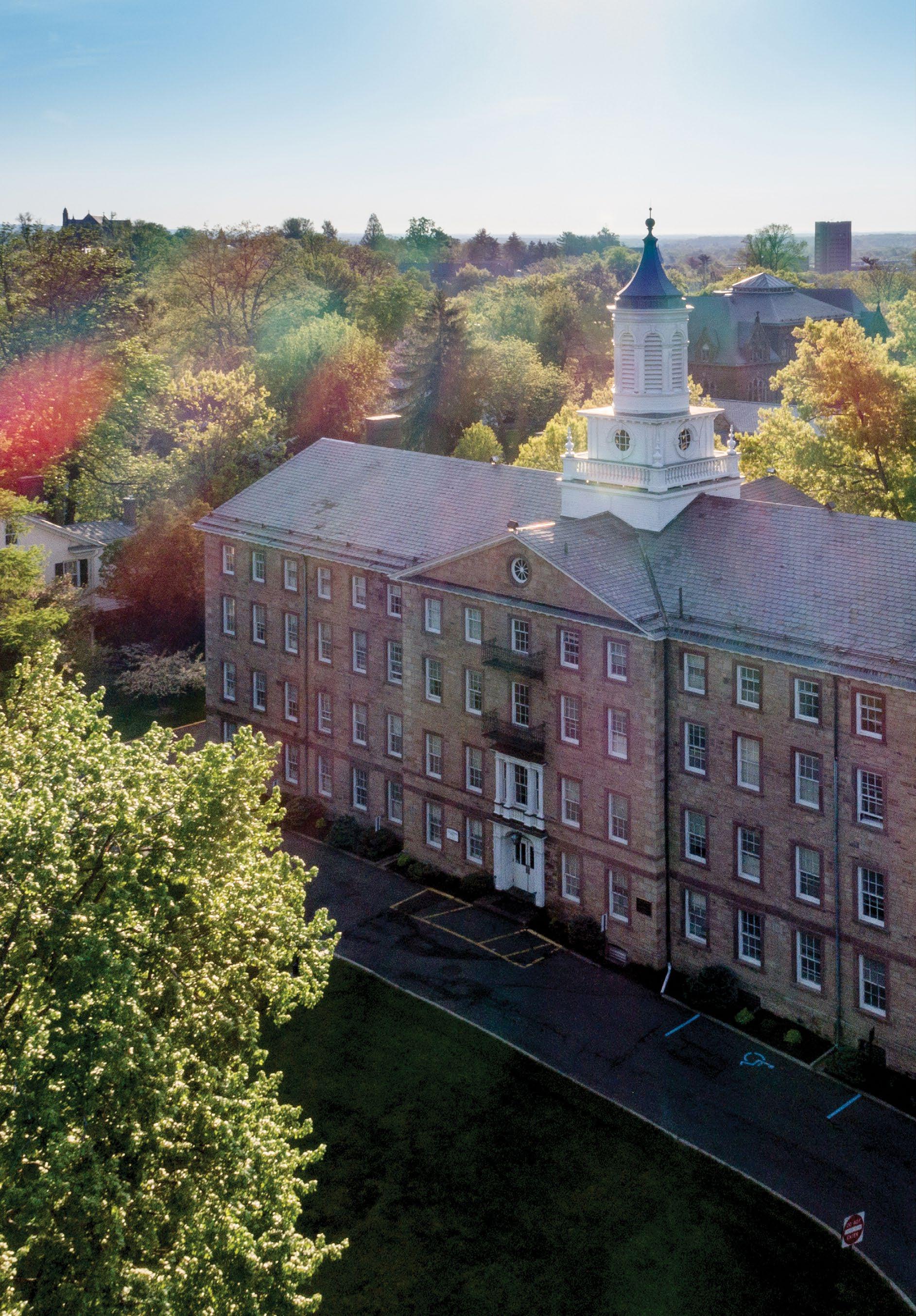
PRINCETON THEOLOGICAL SEMINARY 2021–2022 Annual Report
PRINCETON THEOLOGICAL SEMINARY 2021–2022 Annual Report
Dear Princeton Seminary family,
You are an important part of Princeton Theological Seminary. Our community is comprised of students, scholars, pastors, professors, chaplains, and leaders in many fields of service. Some are studying today in Princeton and others are now serving around the world. Some are graduates of this institution and others have never formally studied at the Seminary yet have become part of the family through their generous devotion to our mission.
We are all part of the unfolding story of Princeton Seminary, given to us from prior generations, and to which we add our voices and experiences. As we stand upon the shoulders of all who have come before us, we steward this legacy in fidelity to Jesus Christ and in response to the ever-reforming work of the Holy Spirit.
Our community of faith and learning continues to grow and evolve in order to serve faithfully the changing church and the world that Christ loves. In the pages of this annual report, you will read about the stewardship of this legacy and the ways it is being carried forward into the future.
Your support advances the story of Princeton Seminary and enables a new generation to take their place in the next chapter of our history. So we are grateful for all that you contribute as a partner in our sacred calling.
Faithfully, M. Craig Barnes Princeton Theological Seminary President
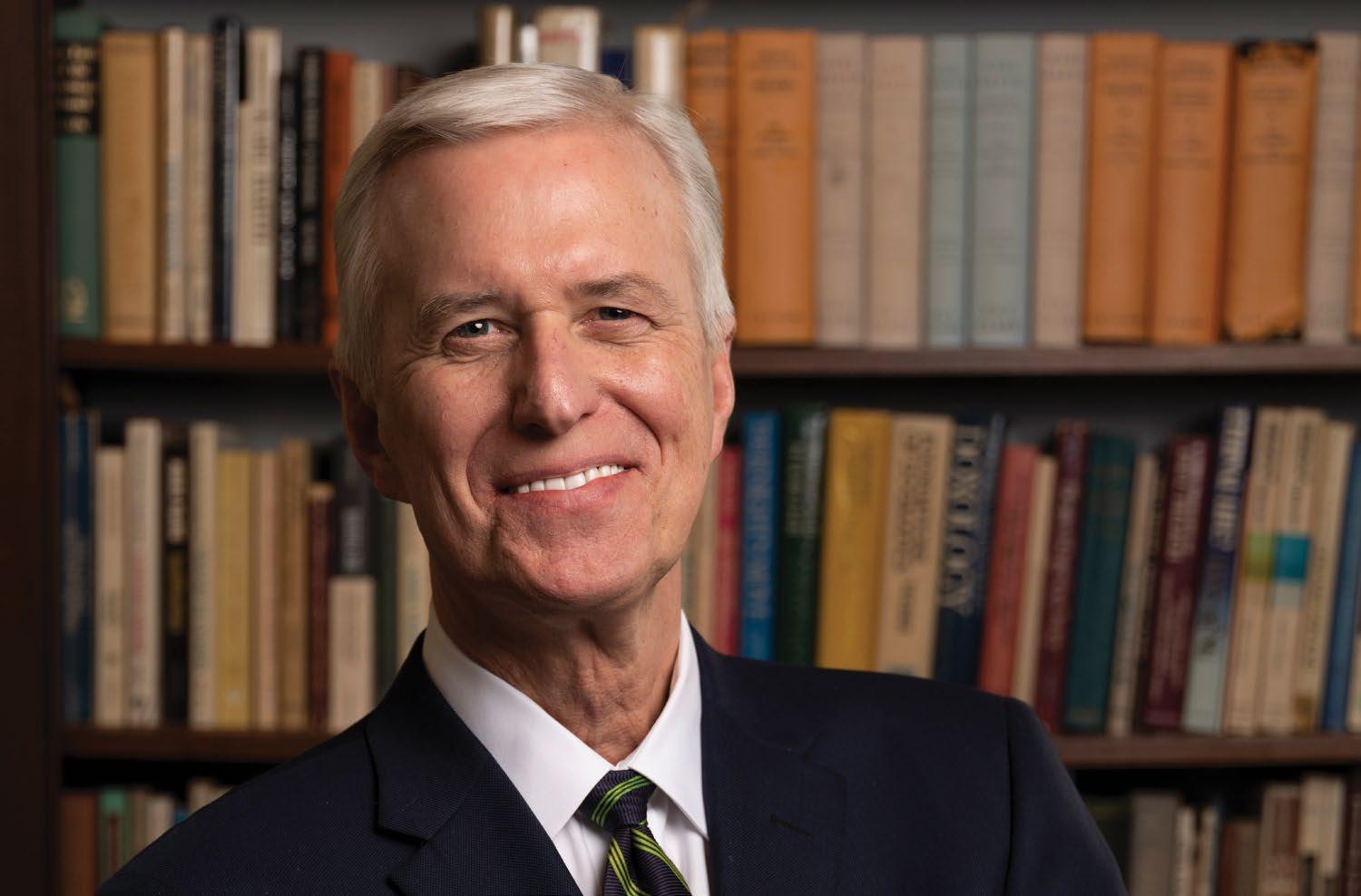
3 2021–2022 Annual Report FROM THE PRESIDENT
for the Future
CLASS OF 1970 ENDOWED GIFT:
Rather than purchase commencement robes, members of the class established an endowed fund. Story based on interviews with three alums (Brewster Gere, James McCormick, and Stanley Wood).
The 1970 Princeton Theological Seminary commencement looked for the most part like previous graduations.
The ceremony got underway with Bach’s Prelude in B Minor . Faculty and graduates processed into the Princeton University Chapel, and the president of the board of trustees gave the invocation.
But there was one small break with tradition.
Several graduates went without robes and instead sported black ribbons on their arms. It was a show of opposition to the Vietnam War, which that year alone claimed the lives of over 6,000 U.S. service members and thousands more Vietnamese troops and civilians.
“There was an awareness of how senseless the war was,” said Jim McCormack, one of the 1970 graduates who engaged in the silent demonstration. “We were killing innocent Vietnamese people, and American soldiers were dying. I was very disturbed by it all.”
McCormack and some of his classmates chose to donate money they would have spent on robe rentals to the Seminary in hopes that the modest sum could be used for student aid.
They never dreamed they were laying the seeds for a fund that would help generations of aspiring clergy and theologians attend the seminary.
The Class of 1970 Scholarship Endowment Fund has grown over the years to provide financial assistance to approximately 60 Seminarians. McCormack said that’s a testament to both the Seminary’s wise stewardship of the original donation, and alumni generosity.
“Only a handful of people actually responded by not wearing robes,” said McCormack, who is retired after nearly four decades as a pastor in Pennsylvania. “But over the years people have been very generous in supporting the fund. They probably didn’t think about it in terms of opposing the war, but in terms of supporting students.”
Graduates from 1970 remember a divided campus, where draft cards were publicly burned by some students but proudly displayed by others.
4 A Promise
“I had great dissonance about that war,” said graduate Stan Wood. “I had friends who were dying in Vietnam, and I had friends who were conscientious objectors.”
For commencement, Wood wore a special pulpit robe that his family had purchased as a graduation gift. But he has long supported the scholarship fund, in part because of the assistance he received himself as a seminarian.
“I give cheerfully in gratitude to God for what I received when I went through Princeton,” said Wood, a consultant, coach, and adjunct professor who leads Sower’s Field, a mission of the Presbyterian Church (USA). “Somebody had thoughtfully provided scholarship money that allowed me to finish seminary without a huge debt.”
Those who have benefited from the Class of 1970 fund include many successful graduates: senior pastors from congregations around the country as well as university professors and other scholars. One recipient went on to become a mental health counselor specializing in treating addiction.
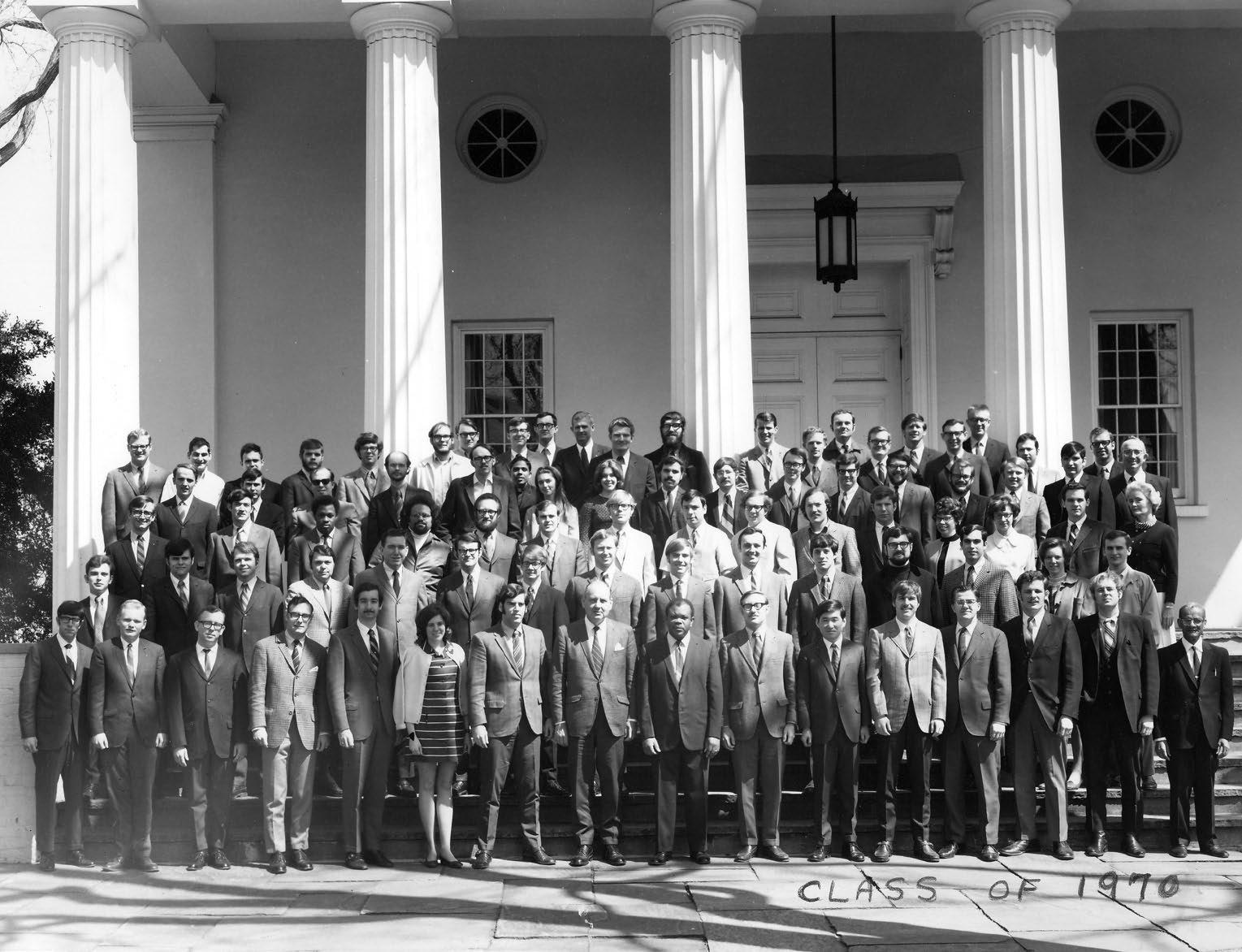
“Every year I would get a letter from a student giving thanks for the money provided by this fund,” McCormack said. “And that is very humbling and gratifying.”
McCormack said he feels proud of both the fund and of his public antiwar stance at commencement, though he recalls that his parents felt embarrassed when he appeared without a robe.
5 2021–2022 Annual Report
CLASS OF 1970, CONTINUED
Another alumnus who did not wear a robe, Brewster (Budge) Gere, who went on to senior pastor roles in Ann Arbor and other locations, also remembers some of the reaction.
“My loving, supportive, proper mother, upon hearing of my decision and the reasoning behind it, said, “Well, dear, I do hope you will wear a subdued tie,’” Gere wrote in an email. “I can report to this day that I was an obedient son—at least in that situation.”
6 A Promise for the Future
BYUNG HO CHOI | PhD
Every time I interact with my professors, their passion for teaching and the sparkle in their eyes when they talk about their research challenges me to follow in their footsteps. And that is one of the key ingredients in helping you become a good scholar.
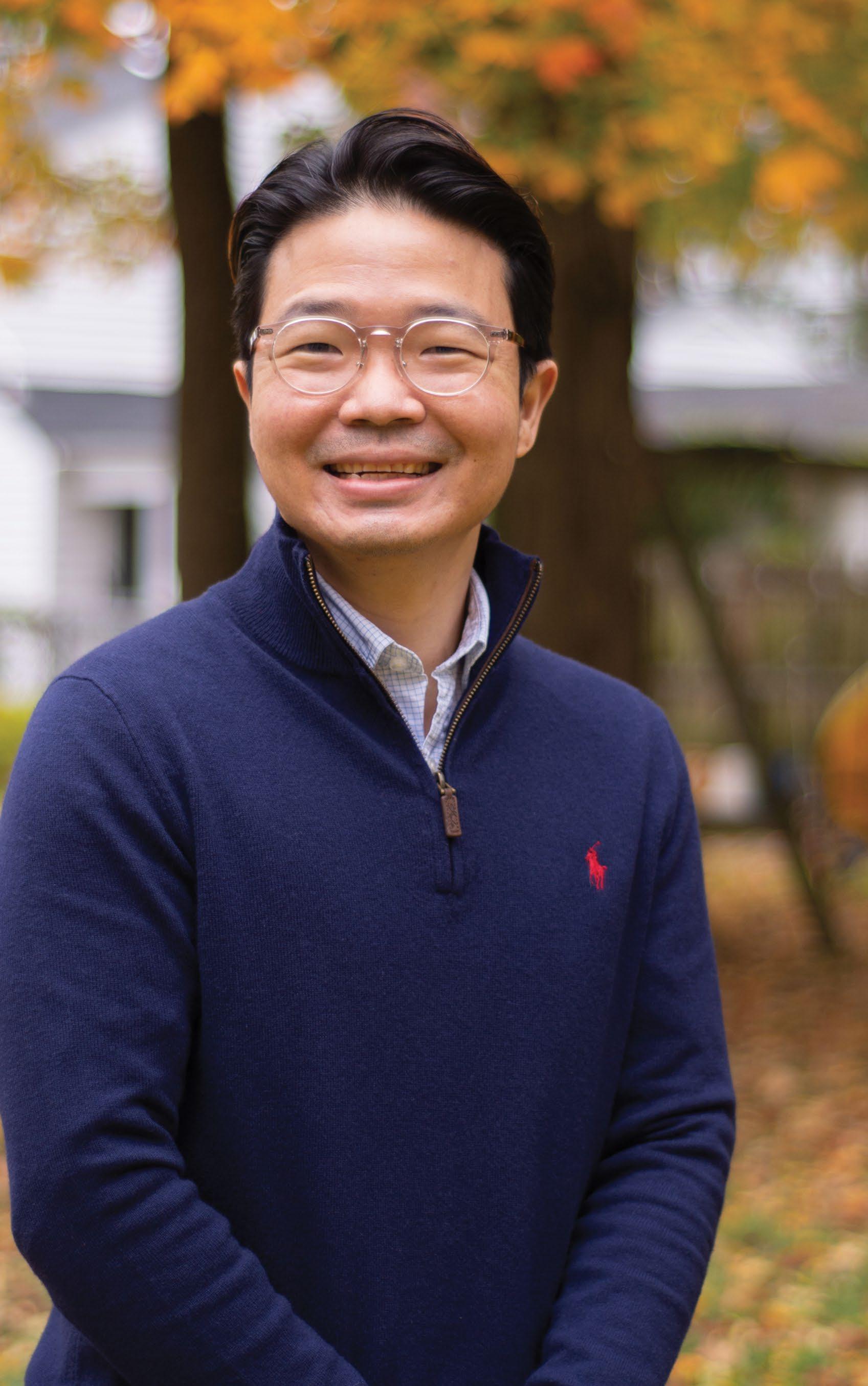
7
Student Feature
RECEIVES
$1.25 MILLION GRANT FOR YOUNG ADULT MINISTRY “COLLABORATORY”
Princeton Theological Seminary has received a $1.25 million grant from Lilly Endowment Inc. to fund The Ministry Collaboratory @ Princeton (the Collaboratory), which will disseminate and build upon findings from Princeton Seminary’s recently completed young adult innovation initiative, The Zoe Project. The Collaboratory will also work with various partners to develop practical resources from this data, to help congregations collaborate with young adults to lead change in their communities.
Princeton Seminary is one of 12 organizations receiving grants through the second phase of Lilly Endowment’s Young Adult Initiative. The aim of the initiative is to deepen the religious lives of young adults (ages 23 to 29) and to engage them more fully in the life of Christian congregations. Lilly Endowment supported creation of The Zoe Project with a grant made to the seminary in 2016 through the Young Adult Initiative’s first phase.
“Collaboration is a key theme in the Collaboratory — between young adults and congregations, between congregations and each other, and between congregations and communities,” says Kenda Creasy Dean, Princeton Seminary’s Mary D. Synnott Professor of Youth, Church, and Culture and faculty liaison to the Institute for Youth Ministry. This approach is based upon key findings from The Zoe Project, which the Collaboratory will highlight. “Instead of just being ‘targets’ of ministry, young adults are eager to initiate and be drivers of new ministries — especially when their churches move beyond the four walls into the broader community. When young adults and congregations collaborate around Spirit-led change in their communities, both grow in faith.” Dean is The Ministry Collaboratory’s faculty senior strategist and was director of The Zoe Project from 2017-2021.
The Collaboratory will make findings from The Zoe Project more accessible through two courses of action. The grant team will work with 90 congregations across 30 communities to test various strategies created during The Zoe Project to broaden their applicability, and encourage young adults and congregations to collaborate on ministry with their communities. “Some of our data suggests that innovative congregations are more likely to work with young adults — and vice versa — because they see young adults as creative initiators of ministry, not objects of it,” says Abigail Rusert, Associate Dean for Continuing Education and former Director of the
8 A Promise for the Future PRINCETON SEMINARY
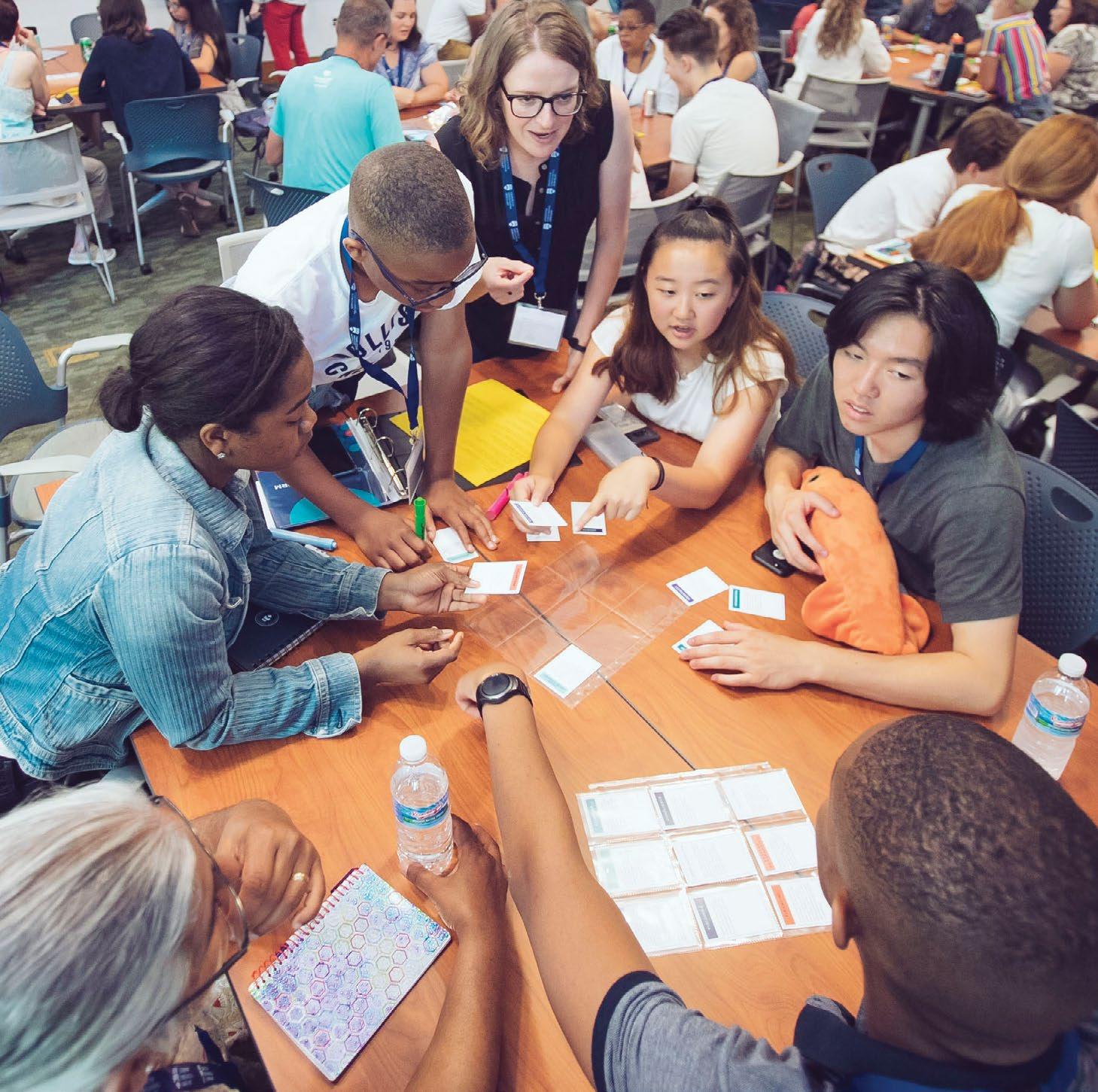

9 2021–2022 Annual Report
MINISTRY
Institute for Youth Ministry at Princeton Seminary. The Institute for Youth Ministry will manage the ongoing work of the Collaboratory.
The Collaboratory will also create a suite of learning tools to help congregations innovate, and to support the changemaking young adults are already doing in their communities. The toolkits will be shared with judicatories and participating congregations to broaden the reach of the learning tools.
The project will continue through December 2026.
10 A Promise for the Future YOUNG ADULT
“COLLABORATORY”, CONTINUED
MICHAELA SILVIS | MDIV/MACEF ’22
Seminary has given me a space to be both challenged and encouraged by my professors, peers, and supervisors. I found lifelong friends alongside an education that I cannot even begin to express my gratitude for.
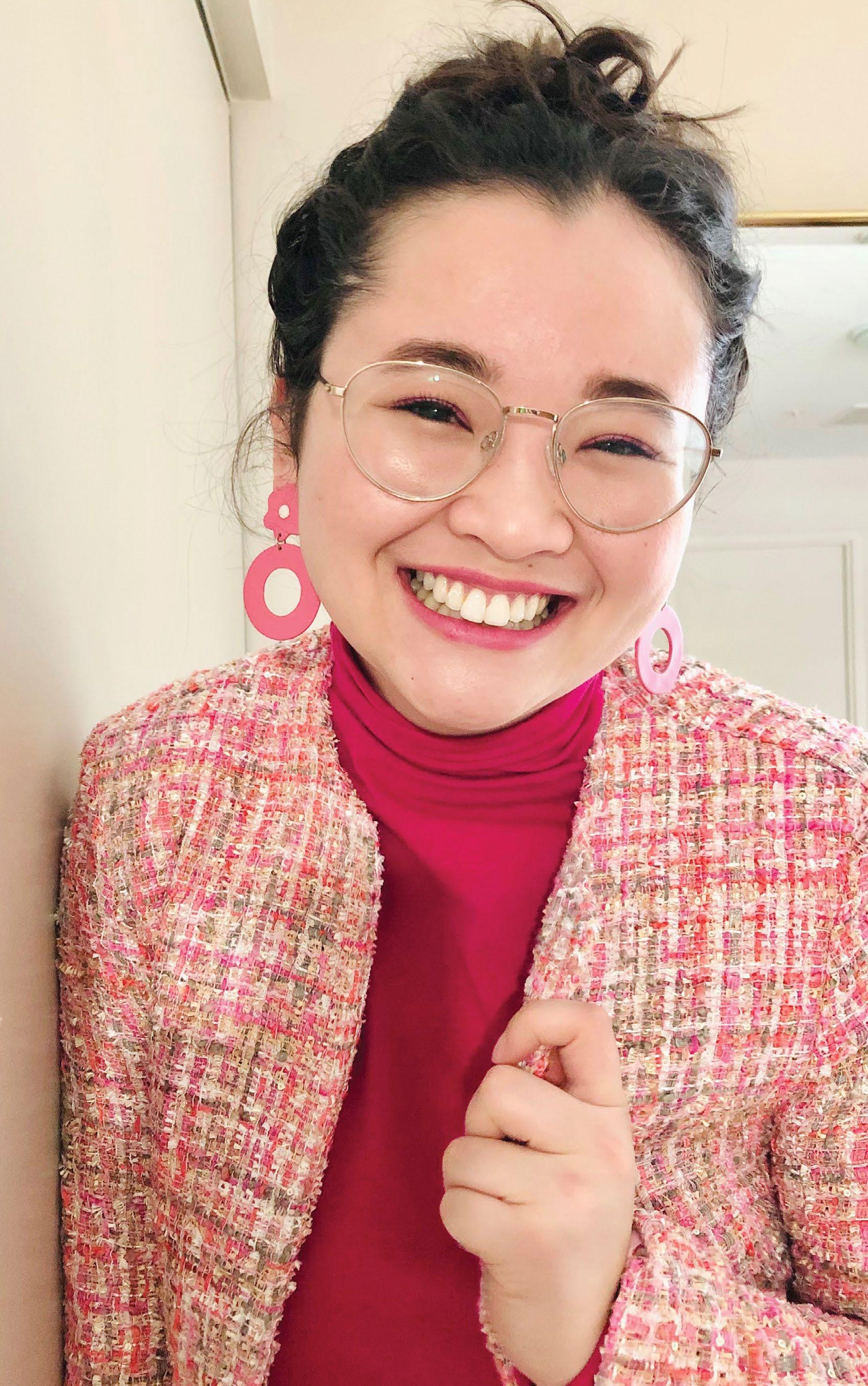
11 Alumna
Feature
STUART HALL GETS AN OVERHAUL
The interior renovation and exterior restoration bring back the building’s original glory
To the novice eye, Stuart Hall may look like nothing has changed since 1876. Yet the project to restore this beloved classroom building took years of study and careful craftsmanship to make the finished product reflect the architect’s original design.
In 2016, the Seminary began the process of planning a complete exterior renovation of Stuart Hall. It started with a comprehensive analysis of the exterior completed in partnership with Historic Building Architects, a Trenton-based preservation firm. They collected samples of the stone and slate, employed ground-penetrating radar to find unwanted moisture, and examined every inch of the building from its original wooden 1880s-era windows to its 1980s-era cooling and heating systems.
In 2019, after three years of study, construction began on Stuart Hall. Updates included a complete rebuild of the gutter system with custom painted copper materials; revamped water management systems that utilize the building’s original brick cisterns; the restoration of ornamental stone finials, medallions, and corbels; the rebuilding of the North Porch using as much original materials as possible; the addition of new sidewalks along the exterior; and the cleaning, repointing, and retooling of existing stones and replacement of those that were defective.
As far as materials go, it’s not an exaggeration to say that no stone was left unturned. The Seminary’s construction team and Historic Building Architects researched the quarries that sold the building’s original slate roof and white stones and, amazingly, they were not only still in business but they were still selling the same materials used in the original construction of Stuart Hall. Updates to the roof and building feature the exact same slate and stones that architect William Appleton Potter would have used when he planned Stuart Hall in the late 1800s.
While the building is one of the campus’ architectural gems, it also functions as a central location of learning, and the classrooms were upgraded with modern comforts for students and faculty. Inside, Stuart Hall got a comprehensive refresh complete with new paint, carpet, and classroom furniture, HVAC updates, bathroom renovations, and enhanced Wi-Fi and classroom technology.
The Seminary worked with IRN, The Reuse Network, to give new life to the classroom furniture that had previously served seminarians in Stuart Hall. More than 500 chair desks were donated to IRN, which then matched the donations to organizations in need of school equipment in Nouakchott, Mauritania and Douala, Cameroon.
12 A Promise for the Future
Stuart Gates pre-renovation
A gift from Trustee Heather Sturt Haaga helped to make possible the transformation of the Stuart Hall gates on the original entrance facing Alexander Street, shown here in before and after images. “The exterior reflects the great history of Princeton Seminary and the interior meets the needs of the twenty-first century learner,” says Denis Castañón, associate vice president of operations. “It’s exciting to see students learning in this historic building restored to its original splendor.”
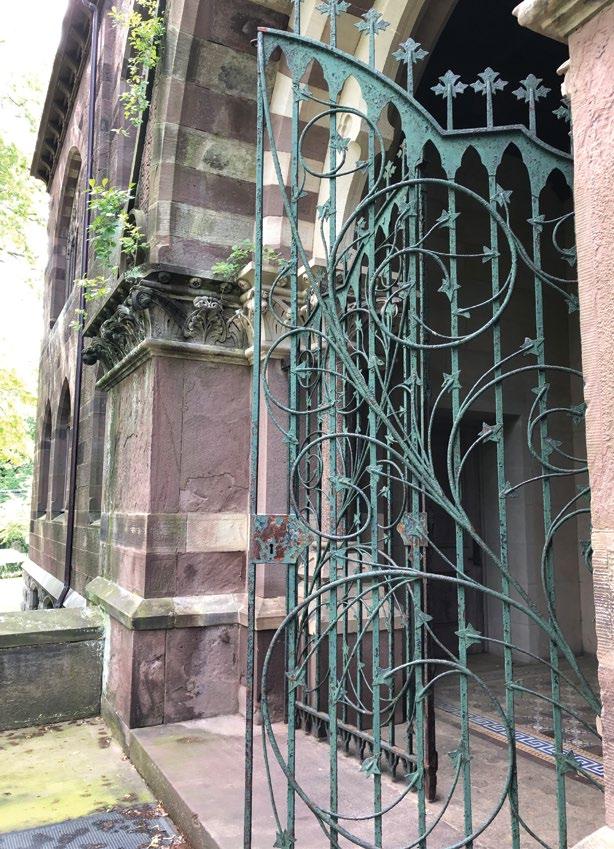
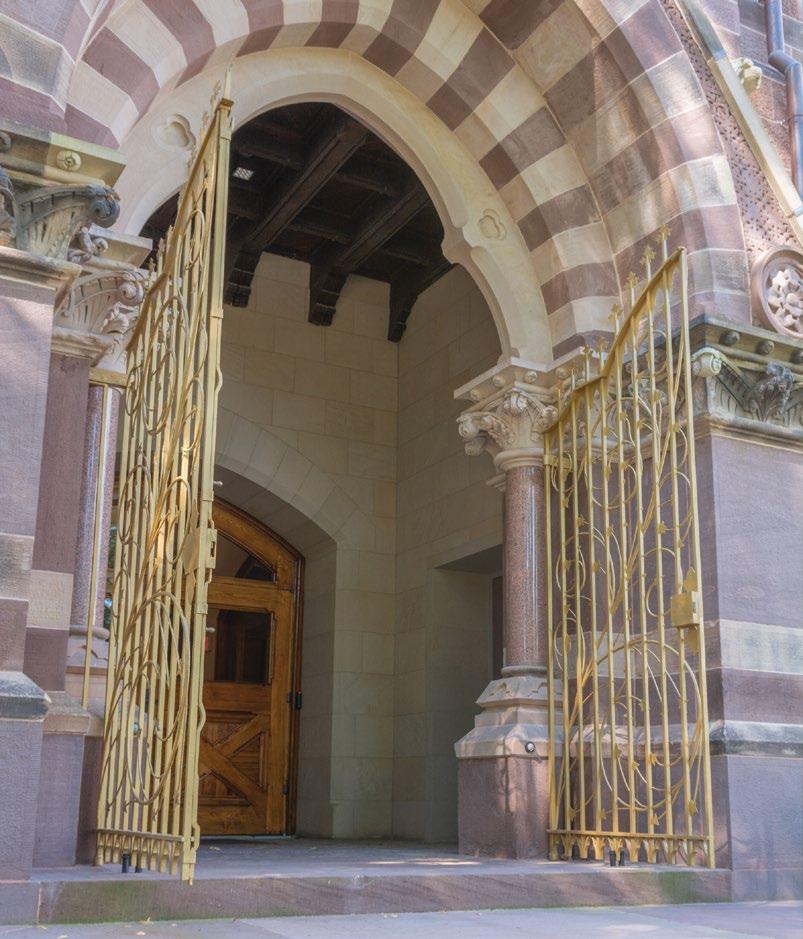
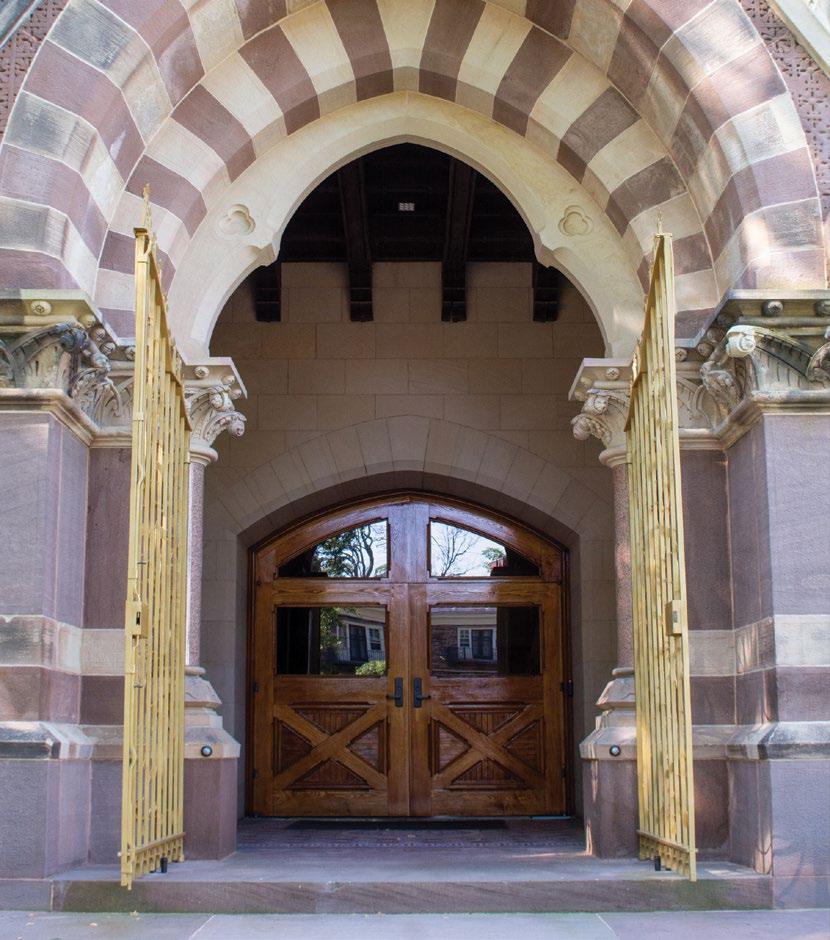
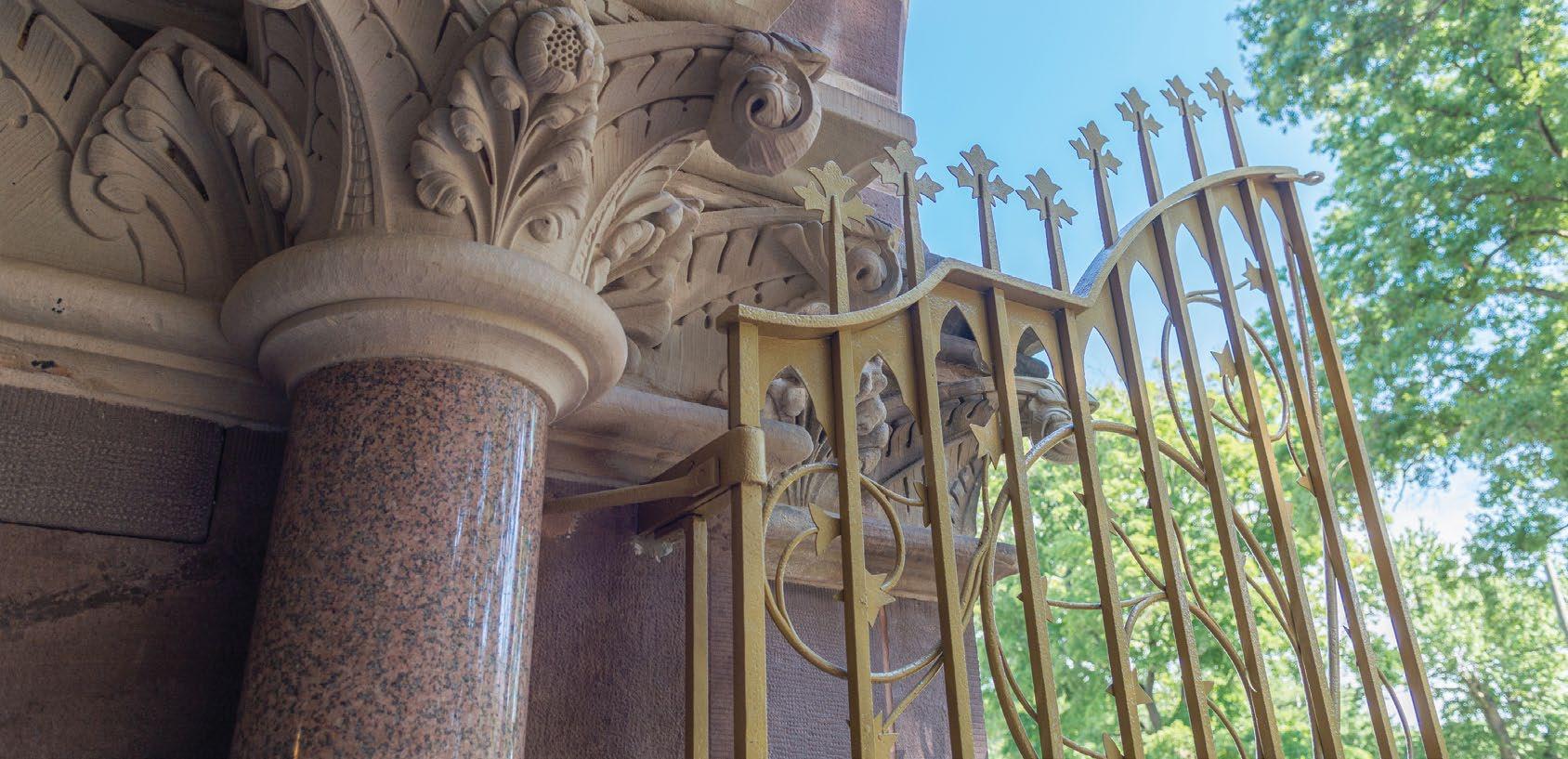
13 2021–2022 Annual Report
IN MEMORY OF THE REVEREND GEORGE GILLETTE
As told by his daughter, Jean Langrill
The Rev. George Gillette had a gift for connecting with people, especially sick, vulnerable people approaching the end of life. And he was quick to drop whatever he was doing to pay them a visit.
Even on his daughter’s wedding day.
Jean Langrill said she was enjoying her reception when her father whisked her and her new husband away to visit a bedridden woman in a nearby nursing home.
“Dad said, ‘She really wants to meet you; it will make her day,’” Langrill recalled during a recent interview. “That’s the kind of guy he was.”
Gillette, ’51, who served as a church pastor in Michigan for nearly four decades, died Dec. 8, 2021, at age 96, after a full life.
He served in World War II aboard the battleship USS Wisconsin, saw legendary evangelist Billy Sunday preach a tent revival, and heard the Rev. Martin Luther King Jr. deliver a sermon during Lent.
Gillette attended Princeton Theological Seminary from 1948 to 1951. And after years of donating to the annual fund, he bequeathed a generous gift upon his death seven decades after his graduation.
To Gillette, who earned a typical Midwestern pastor’s salary, giving was a spiritual act, his daughter said.
“Throughout his life he was a tither,” she said. “He blessed God, and I think in return God blessed him.”
And he may have felt particularly blessed by his experience at the Seminary.
For in early 1950, while Gillette was visiting a classmate, Dave McConaughy, on Michigan’s Upper Peninsula, he was introduced to Jeanette Lucille Lagerfeldt.
The two were married later that year and stayed that way for over 71 years.
“I met her in the church office,” Gillette wrote in his autobiography. “Absolutely the loveliest girl I had ever met.”
14 A Promise for the Future
The couple eventually settled in Michigan, where Gillette stayed his entire career, including for two long stints at churches in Detroit and Warren.
Langrill has vivid memories of her father going out at night to be with gravely ill people and their families.
“I don’t know how many deaths he witnessed,” she said. “He really took to heart being there as someone left this earth.”
In his final years, Gillette found himself in a nursing home due to an illness that made it difficult for him to speak. But his affinity for others never dimmed.
“The caregivers always said he was so appreciative,” Langrill said. “That was his dominant trait: The personality of wanting other people to be at ease, to never draw attention to himself, to put it on other people.
“That was my father.”
The power of giving is demonstrated every time the Seminary receives a planned gift. George Gillette’s legacy will support many future generations of Seminarians as they pursue their dreams of making a lasting impact in the world.
15 2021–2022 Annual Report
Throughout his life he was a tither,” she said. “He blessed God, and I think in return God blessed him.”
ADDING VALUE TO THE LIVES OF OTHERS
2022 AAEC Service Award recipient Dr. Dharius Daniels helps others unleash their untapped potential
Speaker, coach, and certified emotional intelligence specialist Dr. Dharius Daniels, MDiv ’04, is on a mission to help as many people as possible become their best selves while doing their best work. He is also the lead pastor of the multi-site, multi-regional Change Church, which he founded in 2005 after graduating from Princeton Theological Seminary.
It was Professor of Missional and Ecumenical Theology Emeritus Dr. Darrell Guder’s Missional Theology class at Princeton Seminary that helped Daniels understand what it looks like for a church to do ministry incarnationally and led him down the path to planting his own. Since its inception, Change Church, which accepts all socioeconomic classes, ages, and ethnicities, has helped thousands transform and mend their lives.
Daniels became interested in coaching and mentoring after he received some life coaching from a pastor in 2014. He was looking for ways to better steward his life when his overwhelming schedule led to an anxiety attack.
“I got clearer and developed a greater conviction around things I could do versus what others can do,” he says. “I became happier, healthier, and more productive at the things in my life that actually matter.”
Inspired to do the same for others, Daniels received training in coaching. He began using those skills as a pastor before expanding entrepreneurially with his own coaching groups, and has since trained and certified 130 coaches.
Through his coaching work, Daniels came to understand the important role of emotional intelligence — a set of emotional and social skills that determines how we see ourselves, perceive others, and manage relationships. Emotional intelligence is closely linked to theology, he says, which is evident in the curricula that he and his coaches create around emotional health and wellness.
“When we address emotional health, we attend to a person’s soul,” he says. “There cannot be the transformation of themselves without the transformation of the soul. I can’t help people change until I help them see this.”
Daniels is also a published author. His most recent book, Relational Intelligence: The People Skills You Need for the Life of Purpose You Want , is based on his series of sermons on the ways Jesus managed relationships with his disciples.
16 A Promise for the Future
“I noticed that many people’s problems are tied to relationship management,” he says. “It affects everything.” The book offers guidance on how to assess, define, and align platonic relationships, and activate them to unlock your greatest potential.
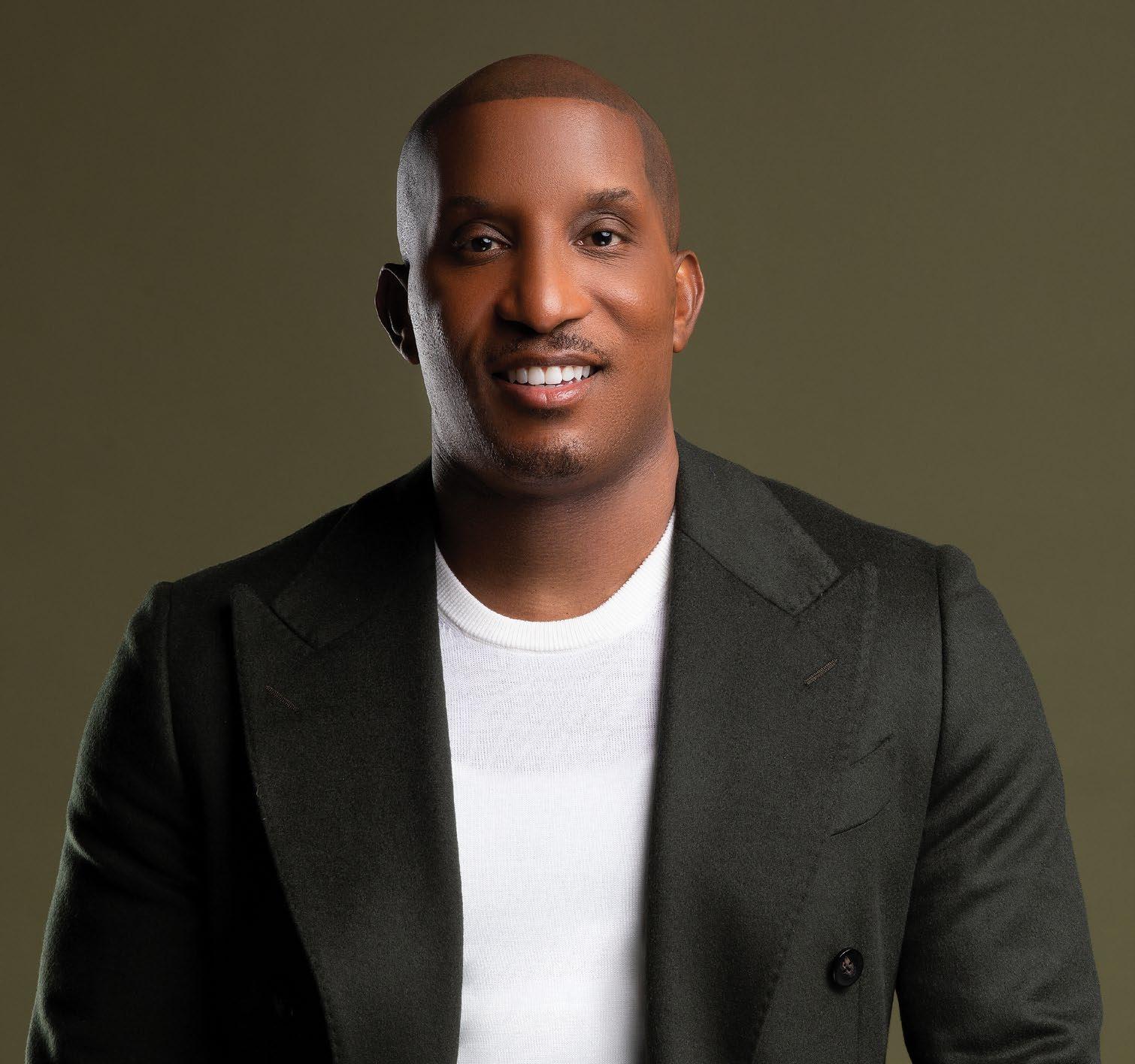
The years spent at Princeton Seminary were highly consequential for Daniels in his formation as a person and his preparation for ministry, helping him to be a more thorough thinker and more gracious when engaging with different points of view.
“It gave me some skills I needed to think critically about what we were actually doing as a church,” he says. Princeton Seminary also exposed him to a diversity of well-articulated views that “prepared me for doing ministry in an era where the culture is becoming much more pluralistic and we’re seeing different ways within the Christian faith.”
His advice for future Princeton Seminary alumni? “Lean in, absorb, and wrestle with what you learn in class because, in ways you can’t predict, it will give you the thinking and presentation skills you’ll need to serve a changing church. These are the skills God is using to prep you for what you don’t know how to prepare for.”
17 2021–2022 Annual Report
IN MEMORY OF THE REVEREND DOCTOR JOHN HARVEY MACLEOD
Daughter recalls father’s love of Princeton Seminary
Even as a young man, the Rev. Dr. John H. MacLeod harbored no doubts about his calling.
“The ministry, to me, is the greatest work in all the world,” MacLeod wrote in his application to Princeton Theological Seminary in the mid-1940s. “I strongly feel that there is nothing for me to do in this world save that of preaching the Gospel.”
That feeling never left. Even 50 years later.
After retiring in 1995 as pastor of Homestead United Presbyterian Church in the Pittsburgh area—where his work included ministering to people devastated by the decline of the steel industry—MacLeod, ’48, found it impossible to step into the quiet life of a retiree.
“He was only retired a few months when he said, ‘This isn’t for me,’” said his daughter, Sarah MacLeod. “He wanted to minister. That is what he loved.”
So, he took interim assignments at local congregations, preaching until the age of 85— for a total of 65 years in pastoral ministry.
MacLeod died February 26, 2020, at the age of 94.
Now, his calling to serve others will live on after his death. A generous gift from Sarah allowed the seminary to create the Rev. Dr. John H. MacLeod Memorial Scholarship Fund aimed at providing financial assistance to eligible students.
“I wanted to do something to commemorate his life,” she said. “He would have been honored to know that a student who might not be able to afford to go to seminary would now be able to do so.” The scholarship is a tangible measurement of John McLeod’s belief and commitment to the future of Princeton Seminary. Endowed funds ensure the Seminary’s ability to recruit a richly talented and diverse student body, regardless of their financial or family situation.
MacLeod, a native of Roxbury, Mass., described his Seminary years as among the happiest of his life. After graduating, he held ministerial roles at churches in Ohio before moving to Pennsylvania in 1960 to become pastor at Homestead, a job he held for 35 years.
He and his wife of 67 years, Susan, raised four children.
18 A Promise for the Future
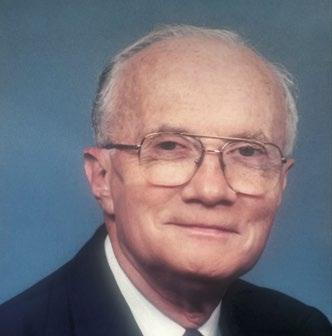
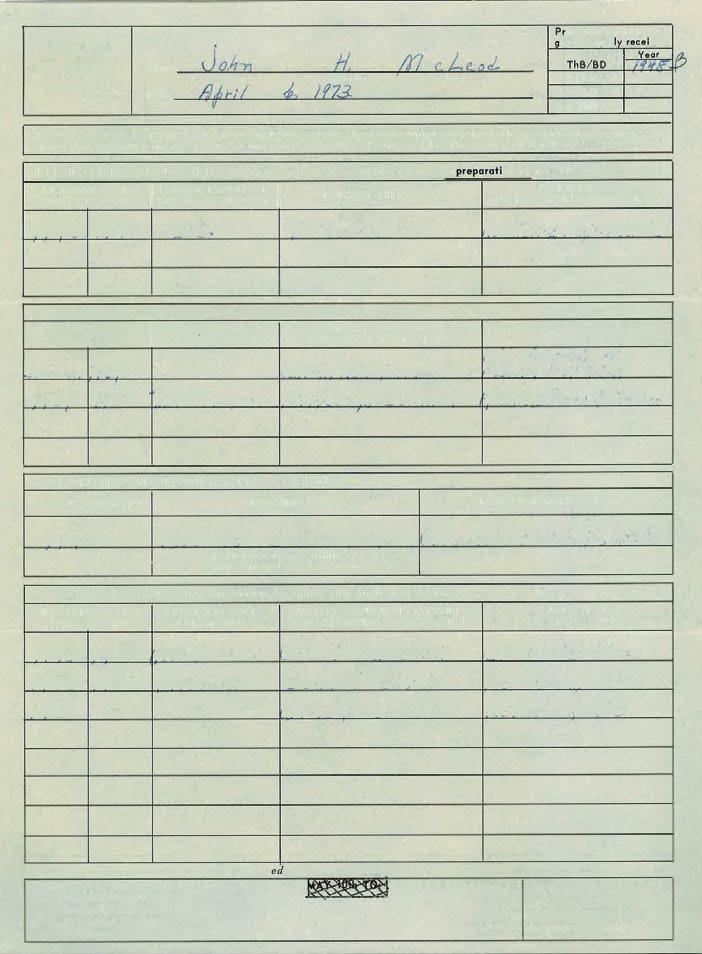
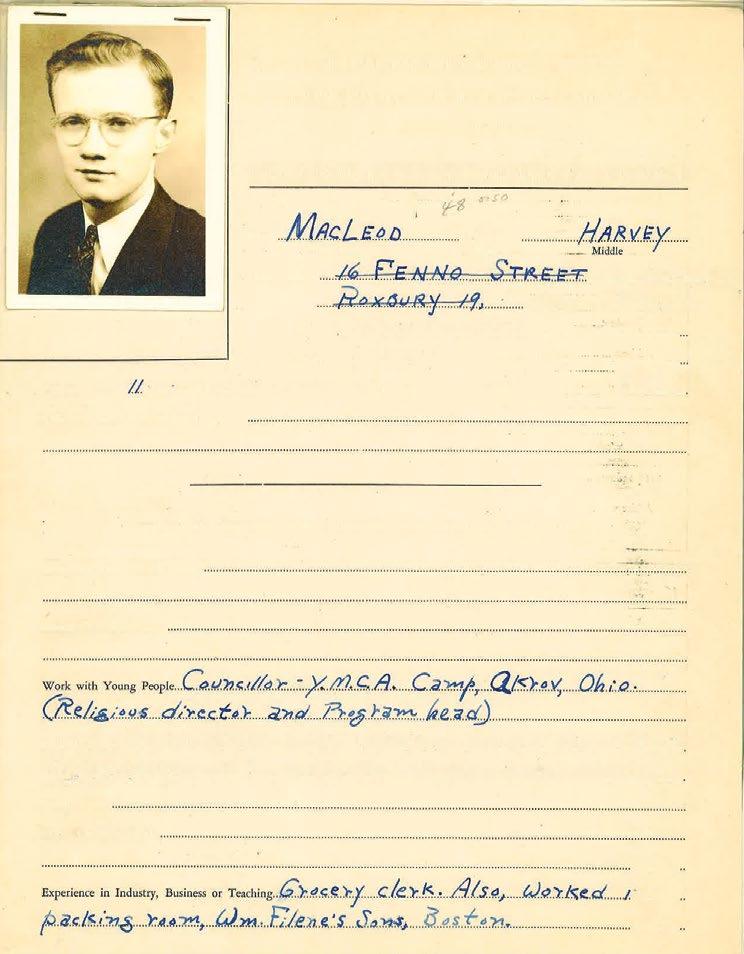
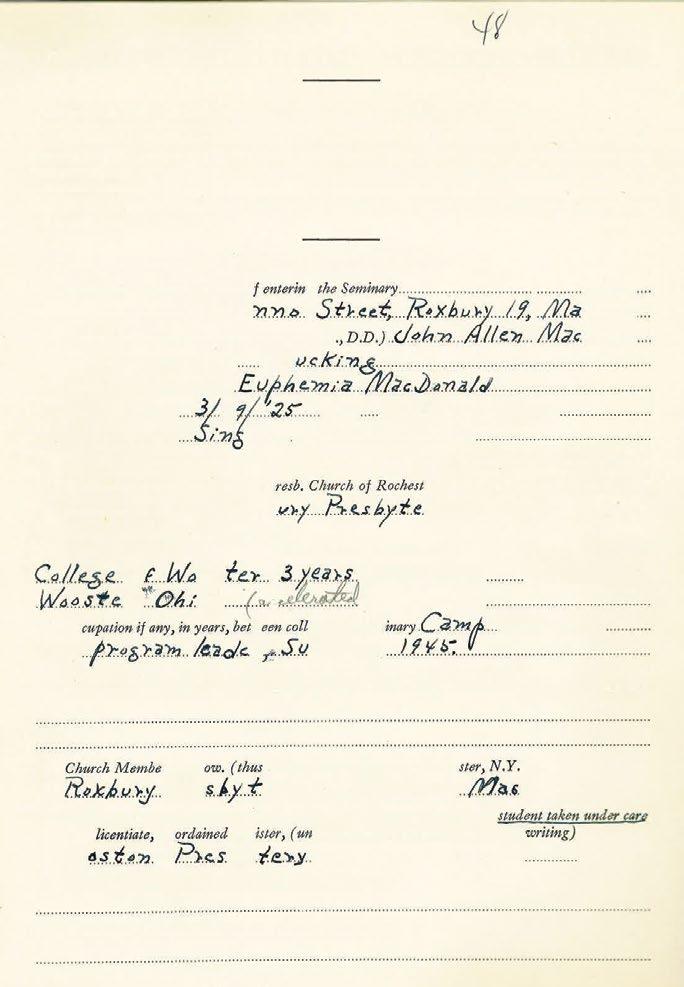
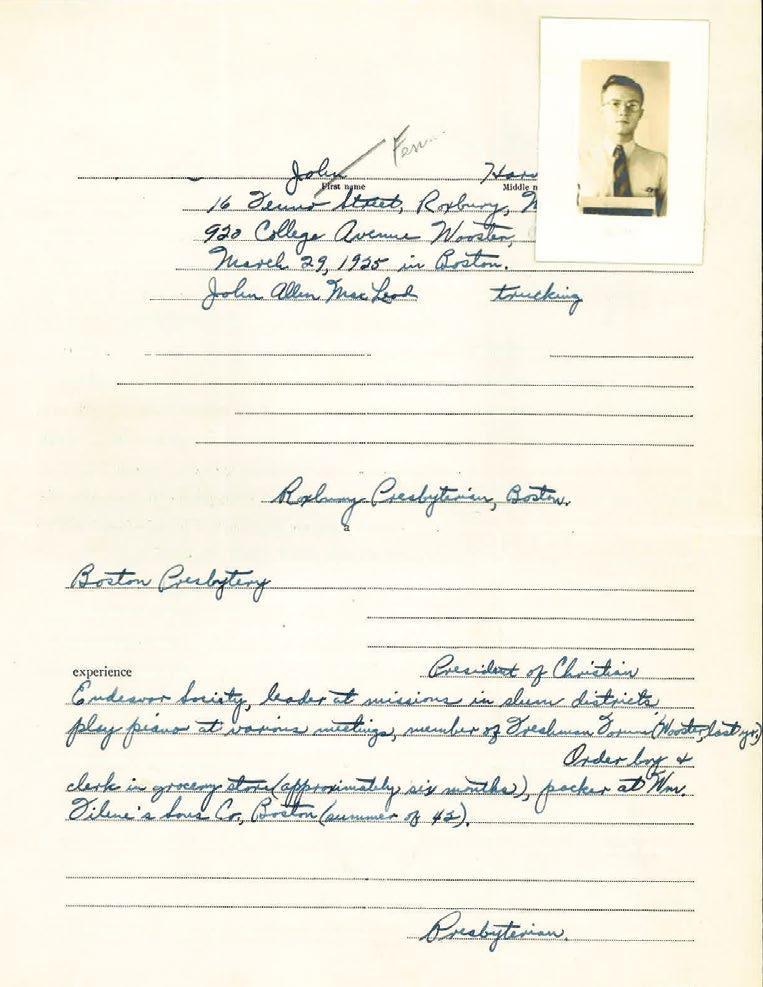
19 2021–2022 Annual Report
The ministry, to me, is the greatest work in all the world”
Princeton Seminary Archive materials printed with permission of the MacLeod family.
DOCTOR JOHN HARVEY MACLEOD,
Ministry to MacLeod was more than preaching from the pulpit on Sunday. It was frequenting local businesses, serving on the boards of the Carnegie Library of Homestead and Salvation Army, and joining the Steel Valley Arts Council.
It also meant staying present and keeping the faith during bad times, such as when the steel industry collapsed in the 1970s and 1980s.
“People in the congregation were losing their jobs, and some had to move away,” Sarah said. “It was a real crisis, and my dad decided to stay in Homestead because he felt that is where he was needed the most.”
It seemed to Sarah that her father worked around the clock, writing sermons, visiting the sick, and participating in the life of the community.
“I felt like I was the daughter of a celebrity because everyone knew my dad,” she said.
As the decades went by, MacLeod mused that no one would be around to attend his funeral.
“I buried my congregation,” he joked.
Yet after his death, crowds of people gathered at the funeral home, forming long lines outside the doors for two days.
“My father always said, ‘Life is relationships,’” Sarah said. “That is what endeared him to people. When they met him, they could tell he was genuinely interested in them and that he was really listening to them.
“He made them feel special.”
20 A Promise for the Future THE REVEREND
CONTINUED
Princeton Theological Seminary is not only an amazing educational institution, but it is a wonderful community. I could not imagine being anywhere else, especially during times like this. I feel extremely supported educationally, spiritually, and emotionally.
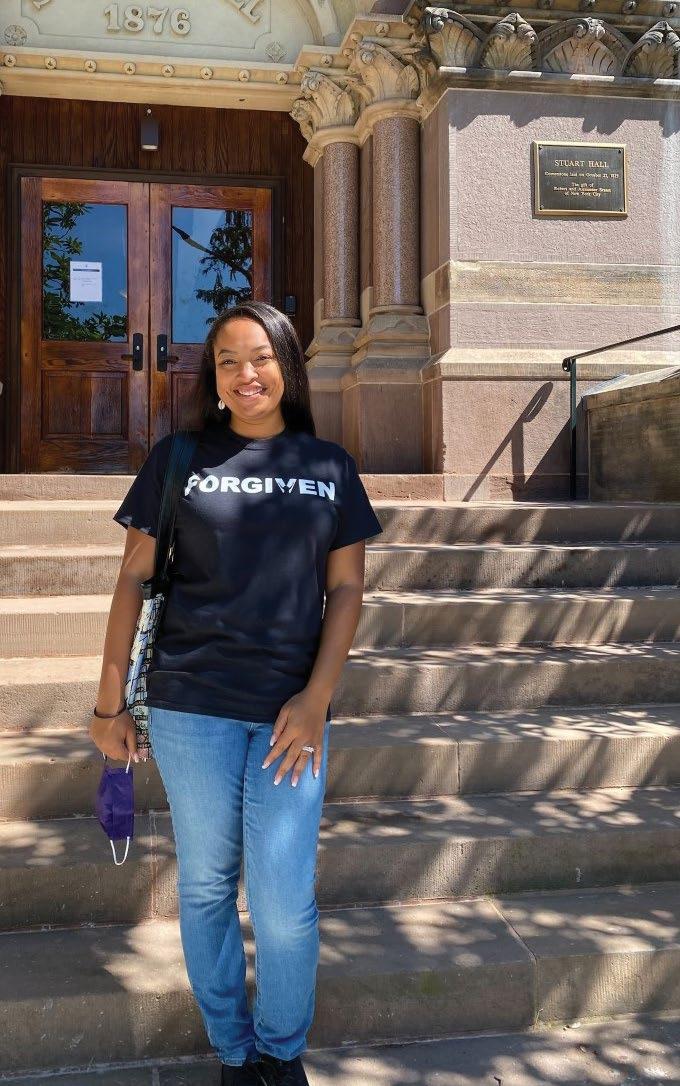
21 Alumna Feature KAMARIA BYRD | MDiv ’22
RESHAPING THE NARRATIVE ABOUT THE ROLE OF FAITH IN POLITICS
Faith in Public Life founder and CEO Jennifer Butler shares her ministry
A decade after leaving Princeton Theological Seminary, Jennifer Butler, MDiv ’95, solidified her calling as founder of Faith in Public Life, a network of more than 50,000 multi-faith leaders and activists who are diligently working to advance social justice policies and reshape the narrative about the role of faith in politics.
“I happened to be in the right place in the right time,” Butler says, “to go at the set of problems that were speaking to my heart … to bring what I see is truly Christian theology to a world in which Christian theology had been captured by voices that were using faith to discriminate and to do harm.”
An ordained minister armed also with a master’s degree in social work from Rutgers University and a bachelor’s degree in education from the College of William and Mary, Butler spent her early years working for international human rights representing the Presbyterian Church (USA) at the United Nations. She is former chair of the White House Council on Faith and Neighborhood Partnerships and served the Peace Corps in Central America.
“I came to lead Faith in Public Life in 2005 with the goal to reinvigorate a progressive prophetic public voice for faith leaders,” Butler explains from her Washington, D.C., home. “To encourage people to stay grounded in their unique faith tradition and to speak out and model dialogue and respect for other faiths.”
Butler grew up in Atlanta, Georgia, as a member of a mainline Protestant church during the height of the 1980s nuclear arms race. “I was terrified to think that human beings had the capacity to destroy one another,” she says. “I saw Jesus as a peacemaker, but I didn’t really see that issue being discussed in the church. I would stay awake at night just thinking about this.”
Additionally, as part of the first generation in the south to attend integrated public schools, Butler says, she began to “wake up to the fact that racism was rife in the south and even among family members.”
This dissonance between what Christians said they believed and how they operated and how Americans claimed to embrace democracy haunted her throughout college and her early career.
“We were doing nefarious things in Central America. Our foreign policy was hurting other countries and didn't subscribe to human rights practices,” Butler explains.
22 A Promise for the Future
“I came to Princeton with all of that in my head, trying to put those pieces together and trying to have a theological articulation of the Jesus I knew,” she says. “Princeton Seminary gave me the words to speak and think theologically. I especially discovered that feminist and Black liberation theology really articulated what was bubbling up in me.”
Butler says there were times, as a woman in ministry, she doubted her own voice and leadership.
“I didn’t know if there would be a place for me in the church because of some of the things I’d seen and experienced,” she says. She chokes up recalling Dr. Brian K. Blount, MDiv ’81, now president of Union Presbyterian Seminary, as a favorite Princeton Seminary professor and one of many who helped her find her voice. “And he did it in a way that was both pastoral and prophetic. It made me feel like I belonged somewhere,” she adds.
Her fellow students were also instrumental in her growth. “We formed a tight community of support,” Butler says, “and I’m still very much in touch with them.”
She encourages today’s students to do the same: “Invest in deep friendships with people who you can walk with through life and through ministry,” she advises. “Dig deep, and advocate for what you need. And try to do all of the reading,” she adds with a slight laugh.
“I hope I can look back on this moment and say that Faith in Public Life helped reinvigorate a progressive faith voice. And that my book [ Who Stole My Bible? ] helped lead lots of people into a new theology and out of the wilderness of a broken faith,” she concludes.
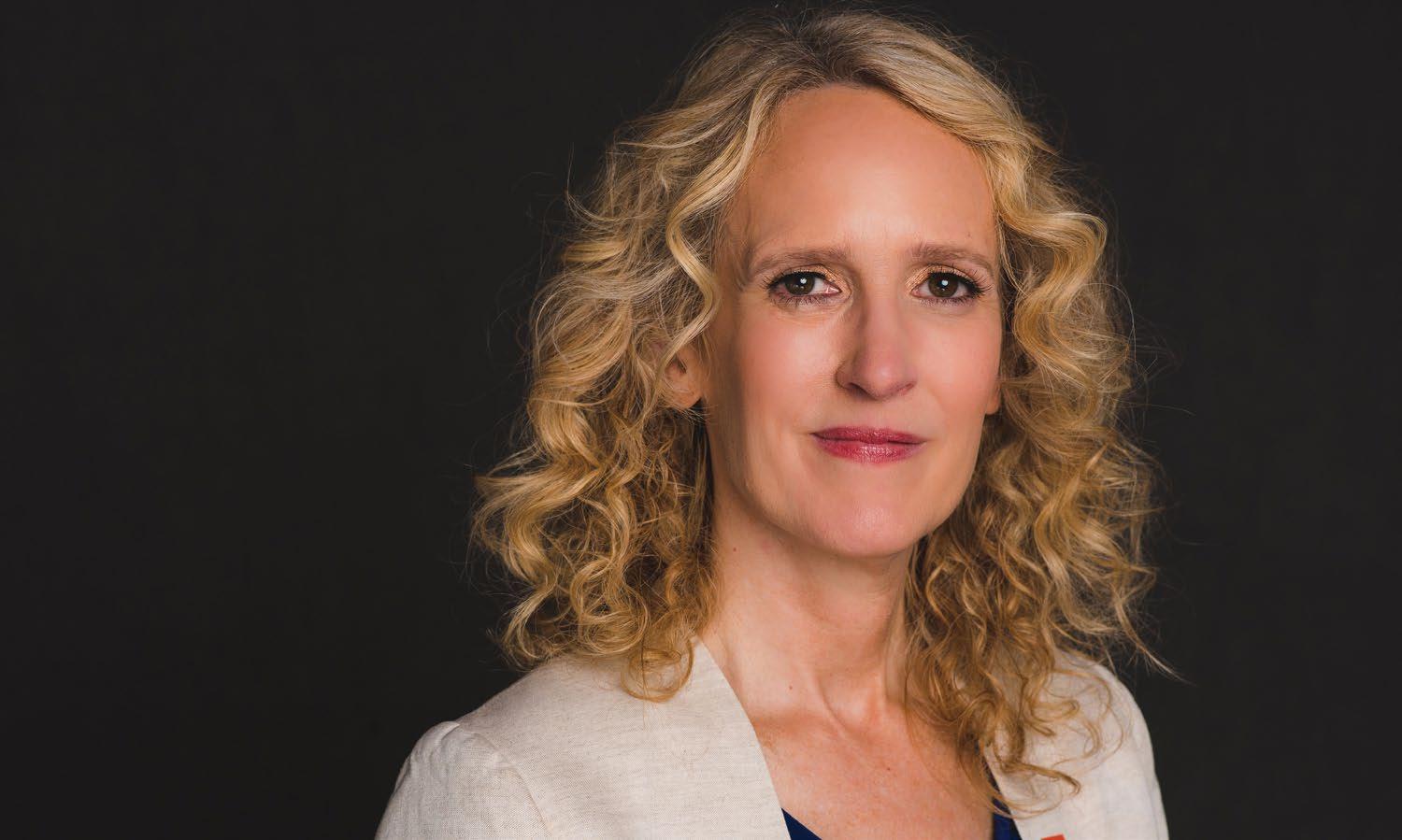
23 2021–2022 Annual Report
PRESIDENT BARNES ANNOUNCES RETIREMENT
After serving for nearly a decade, President M. Craig Barnes announced his retirement, effective at the appointment of a new president, but not later than June 2023. In a letter to the Seminary community Barnes said, “Princeton Theological Seminary was one of the world’s preeminent theological schools long before I arrived. It has been an incredible honor to help it navigate its way into a new day of service to a changing church and society.” Board of Trustees chair Michael Fisch said, “Over the last nine years, President Barnes has guided the Seminary through a period of significant change. In turn, this community is now ready to embrace the future with honesty, courage, and confidence in God’s abiding love.”
Barnes, who began his presidency in January 2013, added in his letter, “When I began my service as your president, I stated often that I took this job because I love the Seminary. As I approach the end of that service, I know the Seminary far better than when I began, and I love it even more. That’s because I keep seeing signs of God’s faithful love for our covenant community. And that never retires.”
FOUR NEW FACULTY MEMBERS JOIN PTS
Four new faculty members were appointed in June:
Dr. Ki Joo “KC” Choi, Kyung-Chik , Han Chair Professor of Asian American Theology , whose teaching and research areas encompass Protestant and Catholic (ecumenical) moral theology, theological aesthetics, peace studies, race and identity, and Asian American theology.
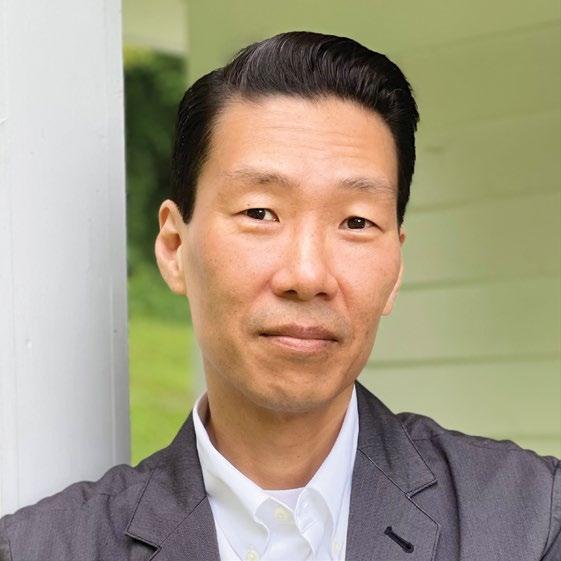
24 A Promise for the Future CAMPUS HIGHLIGHTS
Dr. Lisa J. Cleath , Assistant Professor of Old Testament, researches topics at the intersection of ancient Near Eastern studies and critical theory, including the politics of textual authority in the ancient Near East, postcolonial framing of Second Temple Jewish identity, historical trauma in biblical literature, and whiteness in North American Biblical Studies.
Dr. Amelia Kennedy , Assistant Professor of the History of Medieval Christianity , is a religious and cultural historian of medieval Europe whose research focuses on histories of health, medicine, aging, and disability, as well as Christian monasticism.
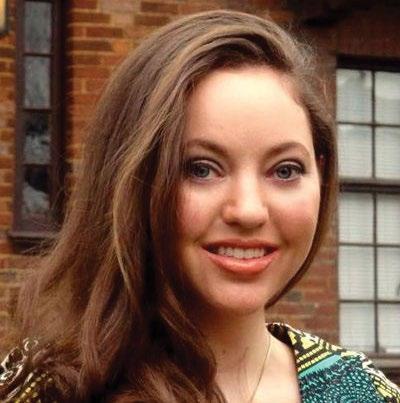
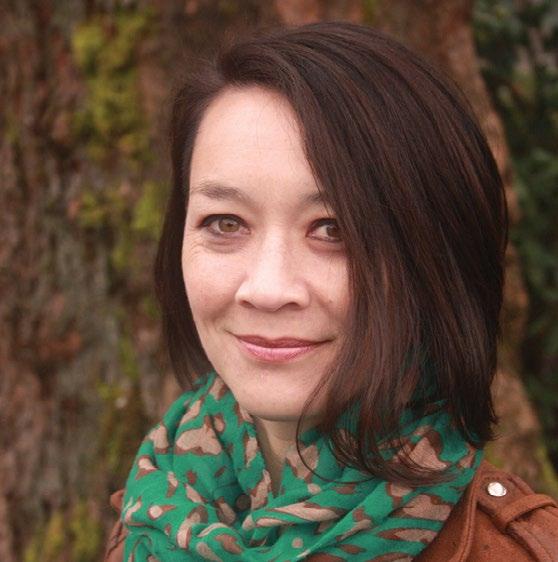
The Rev. Dr. Kimberly Wagner , Assistant Professor of Preaching , focuses on preaching and ministry in the midst and wake of trauma, particularly thinking about collective trauma, the role of the preacher, and the resources of Scriptures and faith to respond to these moments.
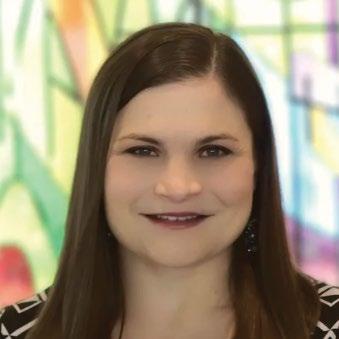
25 2021–2022 Annual Report
CHAPEL GETS NEW NAME
Following a unanimous vote of the Board of Trustees to disassociate the name of Samuel Miller from the chapel, the Seminary’s place of worship is now known as the Seminary Chapel.
The Seminary expressed gratefulness for the prophetic voices of its students, especially the leadership of the Association of Black Seminarians (ABS), recognizing their actions as a moving testimony of covenant community. Diverse students united to lament the pain of having to worship in a chapel named for a slaveholder, opponent of abolitionism, and advocate for the American Colonization Society, which sought to send freed Blacks to Africa.
As part of their commitment to the ongoing work of confession and repentance that was part of the historical audit on slavery, the board also voted to create a task force to include students, faculty, and alumni charged with developing guiding principles and decision-making rubrics for naming, renaming, and conferring honor in buildings and spaces.
OVERSEAS MINISTRIES STUDY CENTER CELEBRATES CENTENNIAL
The 200-year-old Alexander House that was built for Princeton Seminary’s first professor, Archibald Alexander, recently became headquarters for the Overseas Ministries Study Center (OMSC), a renowned research institute that became a program of the Seminary in 2021 after nearly a century as an independent nonprofit. The center, which celebrated its centennial in June, has a decidedly global, 21st-century mission: Engaging in God’s mission by amplifying the voices of the world Christian movement. By exploring the dramatic growth and diverse expressions of Christianity across Asia, Africa, and Latin America, OMSC hopes the West will be able to better learn and fellowship with friends from across the global church.
26 A Promise for the Future
CAMPUS HIGHLIGHTS, CONTINUED
CAMILLE CASTRO | MDiv ’23
Princeton Seminary has challenged me to consider the ways that scholarship intersects with my call to ministry. I came to Princeton Seminary so that I could sharpen my pastoral skills as someone who wants to work in the local church—and yet I think that I’ve been challenged to view academic scholarship as a pastoral practice that will give me the tools to be a better servant to my future congregants.
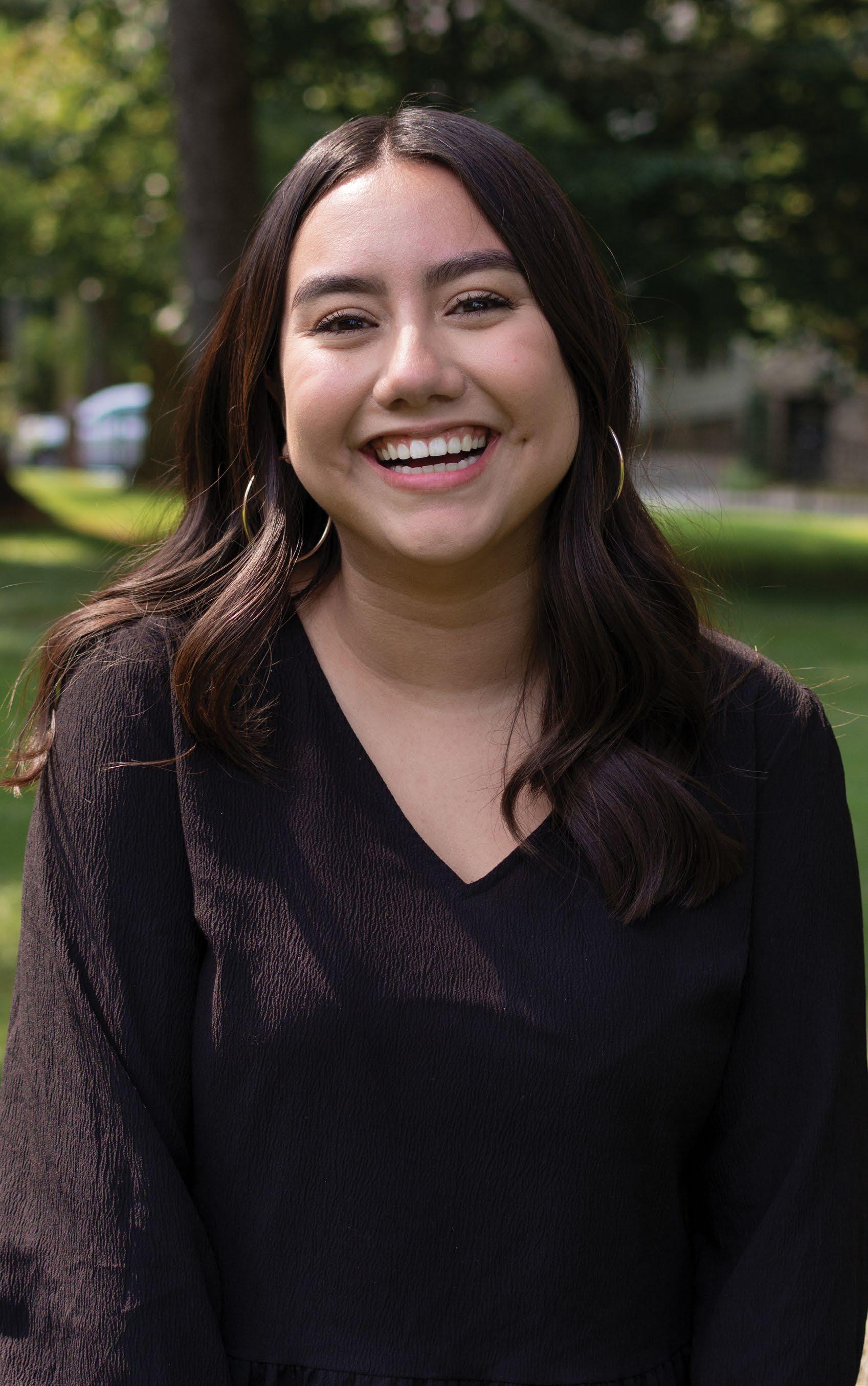
27
Student Feature
SEMINARY EMBRACES BOLD VISION FOR PHD PROGRAM
The Seminary faculty has unanimously endorsed a bold and visionary approach to doctoral education in the 21st century, centered on revisions to the curriculum and daring new professional development initiatives designed to prepare students for leadership within and beyond the academy, and including the creation of a new position of associate dean for PhD studies. This new vision emerged out of a year of intensive study and deliberation, galvanized by a faculty taskforce charged with reimagining doctoral education for a rapidly changing church and world. “The hope, from the outset, was to explore what it would mean for the Seminary’s doctoral program to set the pace in theological education for decades to come,” says Heath W. Carter, Associate Professor of American Christianity and chair of the taskforce.
28 A Promise for the Future CAMPUS HIGHLIGHTS, CONTINUED
BYRON WALKER | MDiv ’24
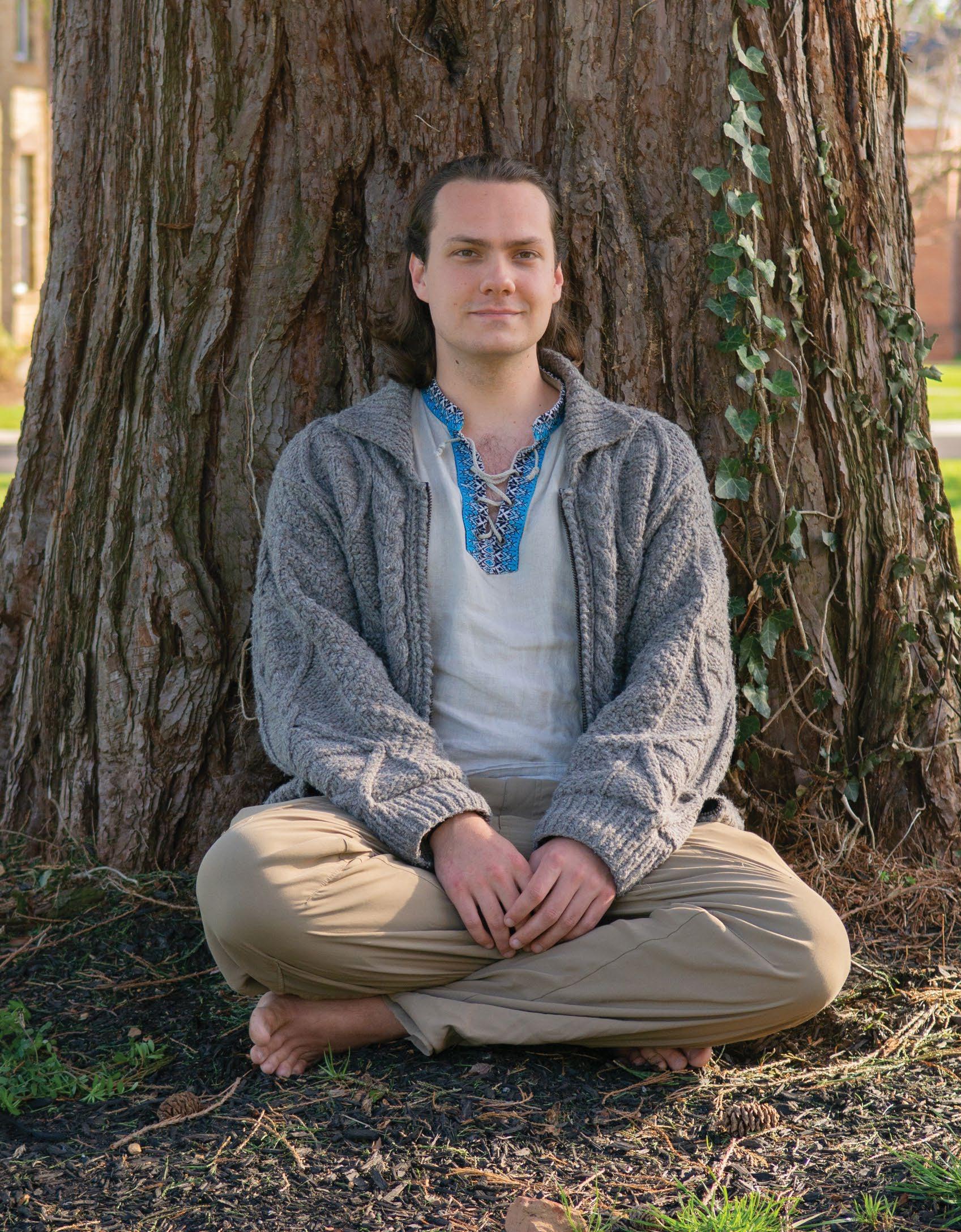
One can be a Christian anywhere, one can even read theologians or books on church history anywhere or at any time of life, but to be here surrounded by these dedicated students and brilliant professors is simply a gem of a life season to be in. What I enjoy most about my Princeton Seminary experience is the honor and pleasure of being surrounded by and pushed to grow and share with such high-quality Christian people. The opportunity to learn and challenge and be challenged in my faith is just brilliant.
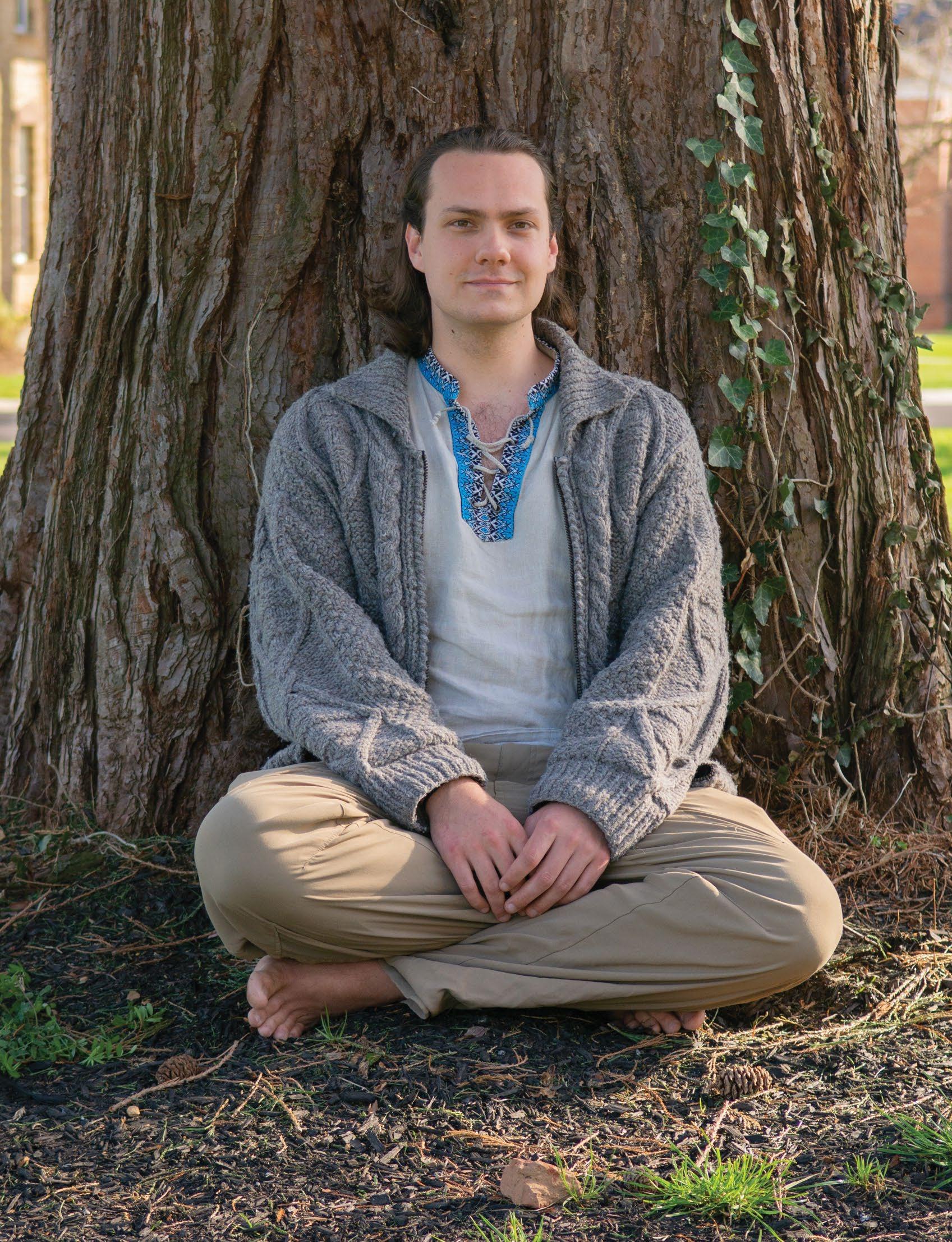
29
Student Feature
M. Craig Barnes, PhD, LHD (Hon.) President and Professor of Pastoral Ministry
Afeosemime (“Afe”) Adogame, PhD
Maxwell M. Upson Professor of Religion and Society
Dale C. Allison, Jr., PhD Richard J. Dearborn Professor of New Testament
Kenneth Glenn Appold, PhD, Dr. Theol. Habil. James Hastings Nichols Professor of Reformation History
Eric D. Barreto, PhD Frederick and Margaret L. Weyerhaeuser Associate Professor of New Testament
Raimundo César Barreto, Jr., PhD Associate Professor of World Christianity
Carl Clifton Black II, PhD Otto A. Piper Professor of Biblical Theology
Lisa M. Bowens, PhD Associate Professor of New Testament
John Rennell Bowlin, PhD Robert L. Stuart Professor of Philosophy and Christian Ethics
Michael Allen Brothers, PhD Associate Professor of Speech Communication in Ministry
Sally A. Brown, PhD Elizabeth M. Engle Professor of Preaching and Worship
Heath Carter, PhD Associate Professor of American Christianity
Keri L. Day, PhD
Associate Professor of Constructive Theology and African American Religion
Kenda Creasy Dean, PhD Mary D. Synnott Professor of Youth, Church, and Culture
James Clifford Deming, PhD Associate Professor of Modern European Church History
Heath Dewrell, PhD Lecturer in Biblical Hebrew
Frederick William Dobbs-Allsopp, PhD Professor of Old Testament and James Lenox Librarian
Robert Craig Dykstra, PhD Charlotte W. Newcombe Professor of Pastoral Theology
Mary K. Farag, PhD Assistant Professor of Early Christian Studies
Nancy Lammers Gross, PhD
Arthur Sarell Rudd Professor of Speech Communication in Ministry, Chair and Director of Masters’ Studies
Yvette Joy Harris-Smith, PhD Senior Lecturer in Speech Communication and Ministry
Thomas John Hastings, PhD Executive Director, Overseas Ministries Study Center
Jay-Paul Hinds, PhD Assistant Professor of Pastoral Theology
George Hunsinger, PhD Hazel Thompson McCord Professor of Systematic Theology
30 A Promise for the Future 2021–2022 FACULTY
LISA BOWENS | PhD
Lisa Bowens, PhD ’14, is the first African American woman to earn tenure in Princeton Theological Seminary’s Biblical Studies Department. Bowens tackles African American understandings and interpretations of Paul by investigating the complex history between the African American community and the teachings of Paul.
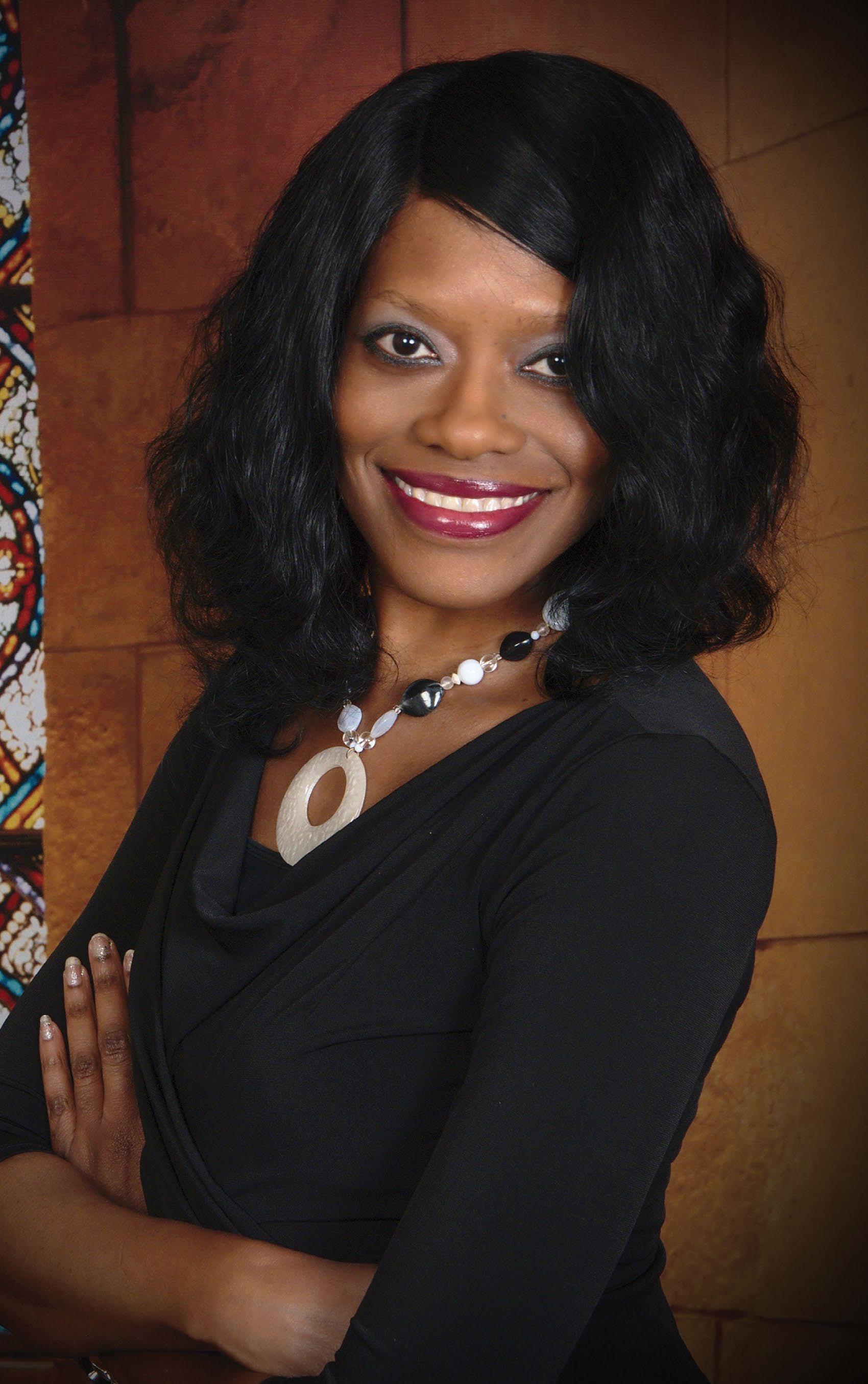
In her book, African American Readings of Paul: Reception, Resistance, and Transformation, she examines writings from the 1700s through the civil rights movement. “We have a rich legacy of interpreters who have gone before us and paved the way for how Scripture can be used as a force for justice,” she says.
“This is in our DNA as Christians, and these interpreters do a wonderful job showing us that.”
31 Faculty
Feature
A Promise for the Future
Elaine T. James, PhD
Associate Professor of Old Testament
William Stacy Johnson, PhD, JD, DD (Hon.)
Arthur M. Adams Professor of Systematic Theology
Jacqueline E. Lapsley, PhD
Dean and Vice President of Academic Affairs and Professor of Old Testament
Cleophus James LaRue, Jr., PhD, DD (Hon.)
Francis Landey Patton Professor of Homiletics
Bo Karen Lee, PhD
Associate Professor of Spiritual Theology and Christian Formation
Bruce Lindley McCormack, PhD, Dr. Theol. (Hon.)
Charles Hodge Professor of Systematic Theology and Director of the Center for Barth Studies
Gordon Stanley Mikoski, PhD
Associate Professor of Christian Education, Chair and Director of PhD Studies
Margarita A. Mooney Suarez, PhD
Associate Professor of Congregational Studies
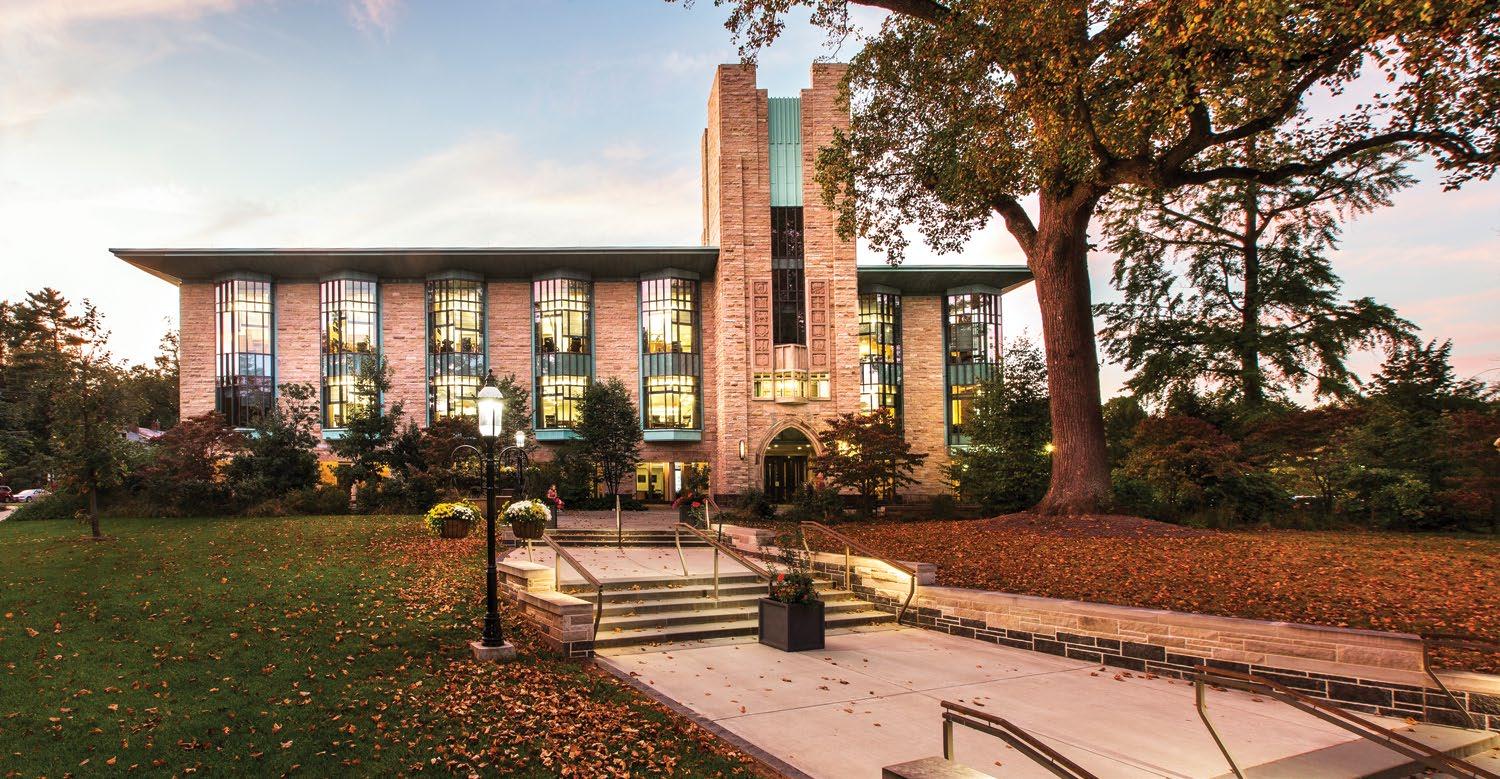
Dennis Thorald Olson, PhD
Charles T. Haley Professor of Old Testament Theology
Brian Rainey, PhD Lecturer in Biblical Studies
Hanna Reichel, ThD Associate Professor of Reformed Theology
Dirk Jacobus Smit, DTh, PhD (Hon.) Ruth and Rimmer de Vries Chair of Reformed Theology and Public Life
Mark Stratton Smith, PhD Helena Professor of Old Testament Literature and Exegesis
Nathan T. Stucky, PhD Director of Farminary and Sustainable Educational Initiatives
Mark Lewis Taylor, PhD Maxwell M. Upson Professor of Theology and Culture
Martin Tel, DMA
C.F. Seabrook Director of Music
Sonia E. Waters, PhD Associate Professor of Pastoral Theology
Richard Fox Young, PhD Elmer K. and Ethel R. Timby Associate Professor of the History of Religions
32
RON DUKES | MDiv/MACEF ’22
I have experienced Princeton Seminary as the renowned pinnacle of academic excellence; however this knowledge has been cultivated from a deep well of love and compassion, which has been pivotal in helping to refine not only my call to ministry but also to deepen my relationship with God. Princeton Theological Seminary has cultivated a community where I can feel comfortable questioning and wrestling with the theological, spiritual, and social issues affecting the greater church communities.
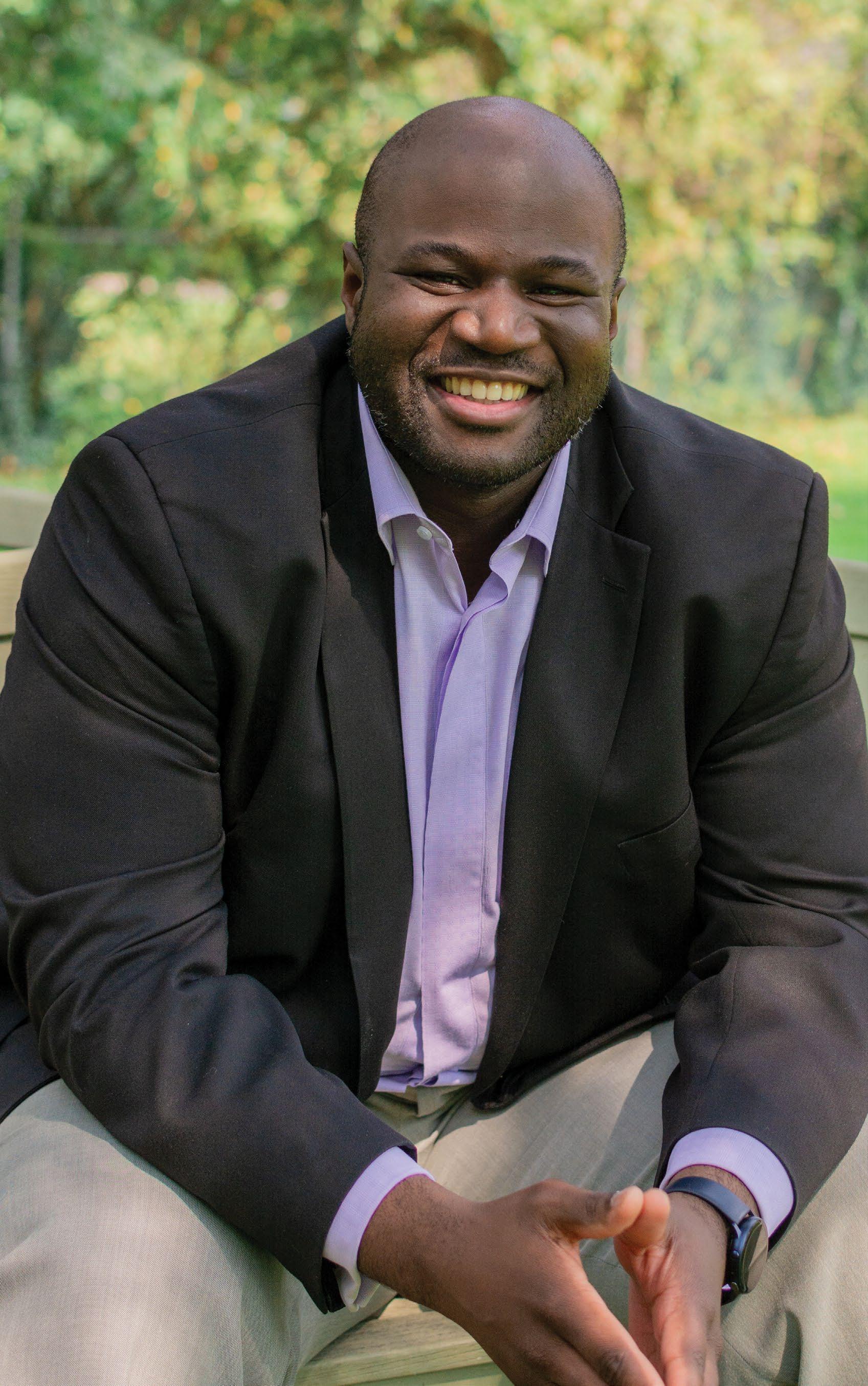
33 Alumnus Feature
Promise for the Future
FROM THE BOARD OF TRUSTEES
Dear Friends,
Thank you for your faithful support of Princeton Theological Seminary. You join generations of generous supporters who have enabled the Seminary’s mission to flourish in many different seasons.
For more than two hundred years, Princeton Seminary has served the church and society by forming Christian leaders who carry out ministries of grace, compassion, service, and scholarship in communities around the world. As we look towards the next era of the Seminary’s mission, your prayers, support, and participation in the life of this community are a vital testament to the unfolding work of the Holy Spirit among us and God’s abiding faithfulness in every generation.
On behalf of the Board of Trustees, thank you for your investment in the education of leaders who are serving the church and our society. Thank you for your part in stewarding the legacy of Princeton Seminary. We are grateful for your partnership in this ministry.
Michael G. Fisch
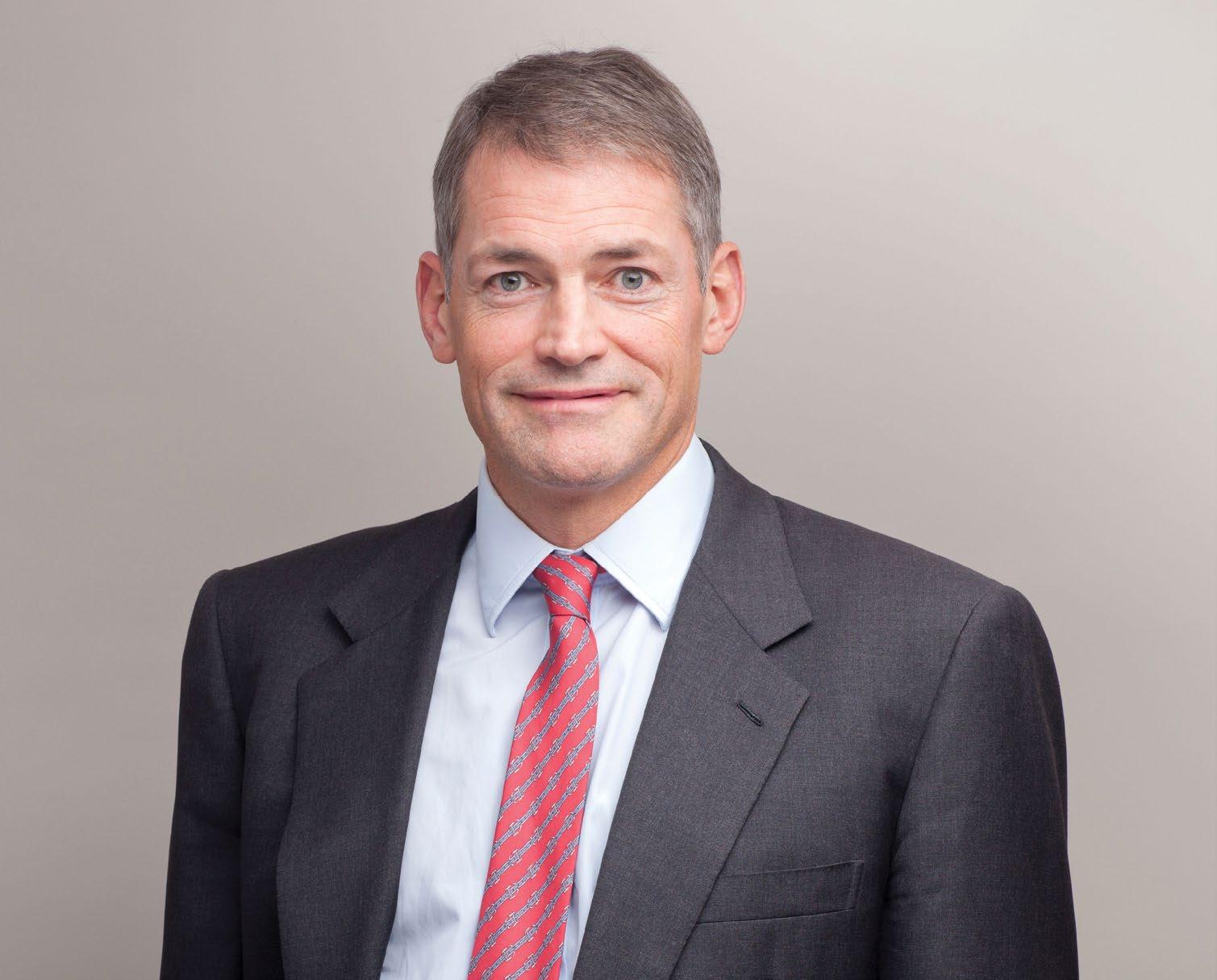
34 A
Princeton Theological Seminary Board Chair
BOARD OF TRUSTEES
Chair
Michael G. Fisch
New York, New York
Vice Chair
Karen Jackson-Weaver Lawrenceville, New Jersey
Secretary
Margaret Grun Kibben Alexandria, Virginia
Darrell L. Armstrong Trenton, New Jersey
Camille Cook Washington, D.C.
Gordon B. Fowler Philadelphia, Pennsylvania
Robert M. Franklin, Jr. Atlanta, Georgia
Doris J. García-Rivera Carolina, Puerto Rico
Nancy Oliver Gray Roanoke, Virginia
Heather Sturt Haaga La Cañada, California
Charles “Chip” Hardwick Birmingham, Michigan
Thomas R. Johnson Sewickley, Pennsylvania
Todd B. Jones Nashville, Tennessee
Shannon Johnson Kershner Chicago, Illinois
Hana Kim Seoul, South Korea
Don D. Lincoln West Chester, Pennsylvania
Jane Doty MacKenzie Lafayette, California
Jay Marshall New York, New York
Deborah A. McKinley Craftsbury, Vermont
Michele Minter Plainsboro, New Jersey
Phebe Novakovic Reston, Virginia
Jeffrey V. O’Grady Nashville, Tennessee Scott D. Renninger Wynnewood, Pennsylvania
William P. Robinson Spokane, Washington
Ruth Faith Santana-Grace Philadelphia, Pennsylvania
Mark P. Thomas St. Louis, Missouri
Robert S. Underhill Bronxville, New York
Jonathan L. Walton Winston-Salem, North Carolina
Peter E. Whitelock Lafayette, California
George B. Wirth Atlanta, Georgia
Steven Toshio Yamaguchi Tokyo, Japan
Sung Bihn Yim Seoul, South Korea
35 2021–2022 Annual Report
A Promise for the Future
INVESTING IN THE FUTURE
From the moment you join our Princeton Seminary family, we make a lifelong commitment to you, and we count on you to make that same commitment to us.
We seek to invest in you by:
Connecting you with alumni/ae near you by launching regional alumni/ae chapters or with whom you share identities and interests by creating affinity groups
Sharing ministry opportunities on our online job board and inviting you to do the same
Supporting your lifelong learning through continuing education events and through exclusive alumni/ae access to our digital library
Keeping you informed about what God is doing on our campus and beyond through monthly alumni/ae emails and quarterly postcards
Hosting regional alumni/ae events and annual alumni/ae reunions both online and on campus
We invite you to invest in us by:
Serving as an alumni/ae volunteer by learning about various roles and signing up at ptsem.edu/alumni-serve
Donating to the Annual Fund , supporting our students through financial aid and scholarships, at giving.ptsem.edu
Serving as a field education supervisor , mentoring the next generation of Christian leaders, at ptsem.edu/academics/field-education
Making a gift through a bequest or trust , impacting generations of alumni/ae to come, at ptsem.edu/planned-giving
For more information about getting involved as an alum, contact alumni@ptsem.edu .
For more information about giving, contact advancement@ptsem.edu .
36
LAUREN MARCH | MDiv ’22
At Princeton Seminary specifically, I have enjoyed making friends with people (students, staff, and faculty alike) who hold different perspectives around faith and who are always teaching me; I most enjoy learning something new every day about myself, others, and about God. “Developing lifelong friendships with other students who are invested in the life and health of the church universal and learning from professors who are passionate about God and the life of Jesus, these are experiences which are unique to Princeton Seminary. I have mostly enjoyed learning something new every day about myself, others, and about God.”
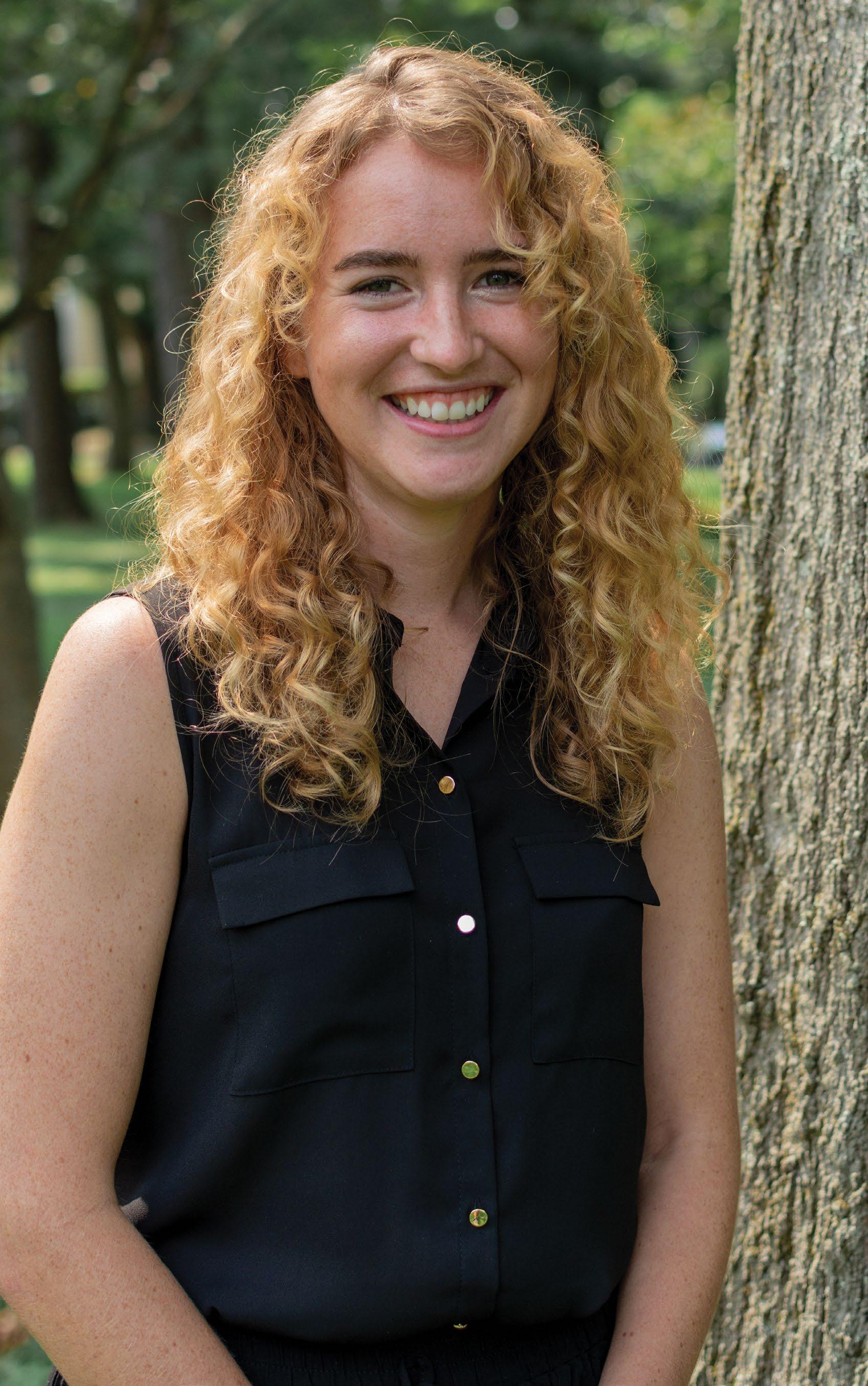
Alumna Feature 37
THANK YOU FOR WHAT YOUR GIFTS MAKE POSSIBLE
Income from our endowment, major gifts, and the Annual Fund allow us to offer all students generous financial support and an education that prepares them to lead with faith and courage. We are grateful for your support.
Total Gifts Received During the 2022 Fiscal Year
(July 1, 2021–June 30, 2022; includes restricted gifts, unrestricted gifts, and endowed gifts.)
OPERATING BUDGET REVENUES
(July 1 2021–June 30, 2022)
Total $47,810,450
$35,813,223
Distribution from Endowment
$6,841,599
Gross Tuition and Fees
$3,168,390
Auxiliary Enterprises (Food Service, Housing, Campus Store)
$1,096,763
Unrestricted Gifts and Grants
$890,475 Other Revenues (Funds Held by Others and Other Revenue)
38 A Promise for the Future 2021–2022 FINANCIAL REPORT
$14,466,866.30
ANNUAL FUND
(July 1, 2021–June 30, 2022)
Gifts to the Annual Fund go directly into the Seminary’s operating budget to fund current programs and to provide support for important new initiatives. These critical unrestricted funds allow us to sustain our generous scholarship program, enrich our residential model of formation, meet unexpected challenges, and seize new opportunities.
BUDGETED EXPENDITURES
(July 1, 2021–June 30, 2022)
Total $47,810,450
$13,674,708
Instruction $9,547,697
General and Administration
$7,852,485 Physical Plant
$7,885,563
$3,230,070 Library
Aid
$2,761,439 Technology $2,858,488 Auxiliary Enterprises ( Food Services, Housing)
39 2021–2022 Annual Report
$1,557,726.09 Raised by the 2021–2022 Annual Fund 1,808 donors Made gifts during the 2022 Fiscal Year
Scholarship/Student
PRINCETON THEOLOGICAL SEMINARY | 2021–2022 Annual Report OFFICE OF ADVANCEMENT P.O. Box 821, 64 Mercer St. Princeton, NJ 08542 ptsem.edu | 609.921.8300































